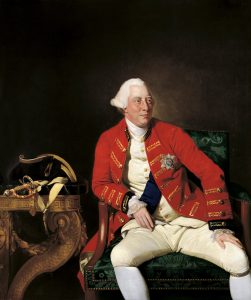Qin Shi Huang (Legalism), Augustus (Roman Empire), Washington (Democracy), and Lenin (Communism): Government’s Changes
Qin Shi Huang used Legalism to centralize the Warring States into the first Chinese Empire; Augustus transformed the collapsing Roman Republic into an autocratic Roman Empire under the guise of tradition; George Washington led a revolution to establish a Democratic Republic based on limited power; and Vladimir Lenin used Communism to violently overthrow a monarchy and create the world’s first one-party totalitarian state.
Each leader inherited a nation in crisis and radically reshaped its government, but their methods and the systems they built were profoundly different.
Qin Shi Huang (Ruled 221-210 BCE): Unification through Absolute Control
- The Situation Before: The chaotic Warring States period, with seven feudal kingdoms locked in constant warfare.
- The Governmental Change: He conquered all rivals and created the first unified, centralized Chinese Empire. He abolished feudalism and replaced it with a bureaucracy of appointed officials loyal only to him.
- The Underlying Philosophy (Legalism): He believed people were inherently selfish and could only be controlled by strict laws and harsh punishments. The state was supreme, and all dissent was brutally crushed.
- The Lasting Impact: The imperial system of a unified, centralized China that he created lasted for over 2,000 years.
Augustus (Ruled 27 BCE – 14 CE): Stability through Autocracy
- The Situation Before: The late Roman Republic was collapsing after a century of bloody civil wars led by powerful generals.
- The Governmental Change: He ended the wars and created the Roman Empire. He cleverly maintained the outward forms of the Republic (like the Senate) but consolidated all real power, especially control of the military, in himself.
- The Underlying Philosophy (Pragmatism): His goal was purely practical: to restore peace, order, and stability—the Pax Romana. He presented himself as a restorer of tradition, not a revolutionary.
- The Lasting Impact: He created the office of the Roman Emperor and established a stable system that brought peace for two centuries.
George Washington (Presidency 1789-1797): Liberty through Restraint
- The Situation Before: Thirteen American colonies under a distant British monarchy, followed by a weak and disorganized government under the Articles of Confederation.
- The Governmental Change: He led the creation of a Constitutional, democratic republic with a separation of powers. His most radical act was his voluntary relinquishment of power after serving two terms, thereby establishing the precedent for a peaceful transfer of power.
- The Underlying Philosophy (Republicanism): He was guided by Enlightenment ideals of liberty, the consent of the governed, and the rule of law. He believed power was a temporary trust from the people.
- The Lasting Impact: He proved that a large-scale republic could function and established the democratic norm of limited executive power.
Vladimir Lenin (Ruled 1917-1924): Revolution through Totalitarianism
- The Situation Before: A collapsing, autocratic Russian Empire under the Tsar, defeated in World War I and wracked by internal unrest.
- The Governmental Change: He led the Bolshevik Revolution, violently overthrowing the old regime. He established the world’s first Communist state, a one-party totalitarian dictatorship where the Communist Party held all political power.
- The Underlying Philosophy (Marxism-Leninism): He adapted Marxist theory, believing that a “vanguard party” of professional revolutionaries was necessary to lead the proletariat, seize control of the state, and forcibly suppress all opposition (the “dictatorship of the proletariat”) to create a classless society.
- The Lasting Impact: He created a new model of government—the single-party state—that was replicated by dictatorships throughout the 20th century, establishing the Soviet Union as a global power.
| Feature | Qin Shi Huang | Augustus | George Washington | Vladimir Lenin |
| Primary Goal | Unification & Centralization | Stability & Order | Liberty & Self-Governance | Total revolution & creation of a new society |
| Method | Brutal conquest, harsh laws | Subtle consolidation of power maintained the Republic’s facade | Revolution, Constitution, voluntary restraint | Violent seizure of power, one-party rule, terror |
| Outcome | Created the first Chinese Empire | Created the Roman Empire | Created the United States as a Democratic Republic | Created the first Communist totalitarian state |
| Legacy of Power | Absolute, hereditary imperial rule. | Absolute, de facto hereditary imperial rule. | Limited, elected executive power with peaceful transfer. | Absolute, one-party rule with no peaceful transfer mechanism. |
Qin Shi Huang: The First Emperor of China (Legalism)
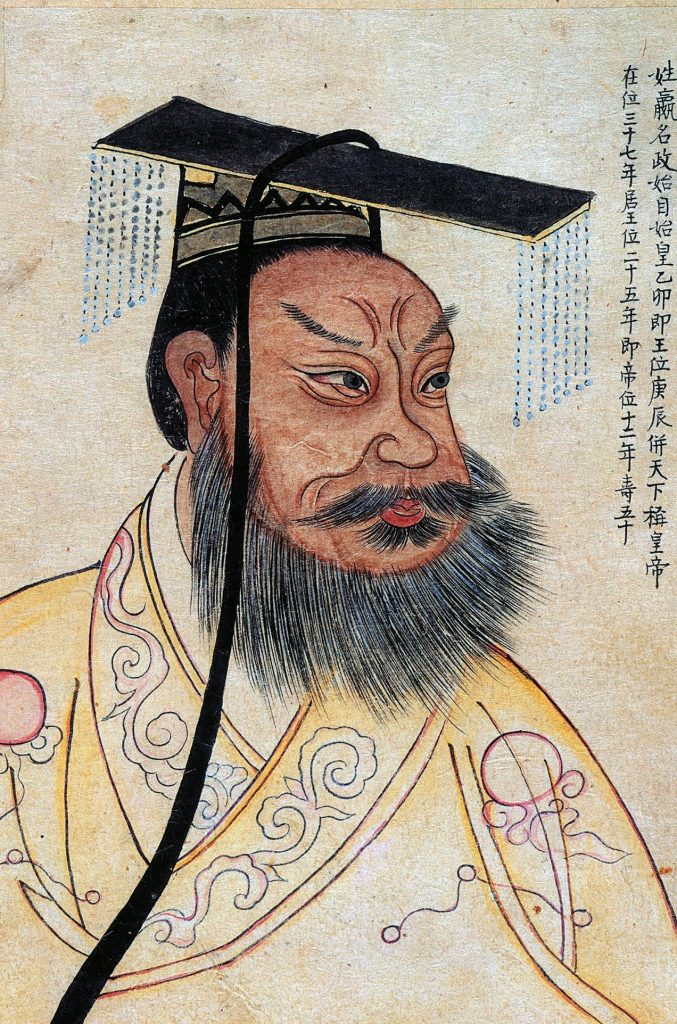
Posthumous depiction of Qin Shi Huang, 19th century (Wiki Image).
Qin Shi Huang Quotes
“To build may have to be the slow and laborious task of years. To destroy can be the thoughtless act of a single day.”
“Do not be amazed at anything I say. I am like a reflection in a mirror, not like a real person.”
“He who is not virtuous is not allowed to remain in the state; he who does not labor diligently is not allowed to eat the food of the people.”
“An oppressive government is more to be feared than a tiger.”
“Silence is a true friend who never betrays.”
“In a country well governed, poverty is something to be ashamed of. In a country badly governed, wealth is something to be ashamed of.”
“The empire, long divided, must unite; long united, must divide. Thus, it has ever been.”
Qin Shi Huang YouTube Video Links Views
Here are some of the most popular and informative YouTube videos about Qin Shi Huang, the First Emperor of China, including documentaries and features on his famous Terracotta Army.
1. The incredible history of China’s terracotta warriors – Megan Campisi and Pen-Pen Chen
- Views: 4,715,288
- Link: http://www.youtube.com/watch?v=mP5p4QbvPtc
- Description: This highly engaging TED-Ed animated video provides a concise yet comprehensive overview of the Terracotta Army and its historical context under Qin Shi Huang.
2. Mysteries of the Terracotta Warriors | Official Trailer | Netflix
- Views: 1,303,694
- Link: http://www.youtube.com/watch?v=9Msxc8AiTrc
- Description: The official trailer for the Netflix documentary, offering a visually stunning glimpse into the archaeological marvels of Qin Shi Huang’s tomb complex.
3. The First Emperor of China’s Ridiculously Dramatic Life
- Views: 1,126,673
- Link: http://www.youtube.com/watch?v=8n1OU9p3fhM
- Description: A popular and entertaining video from Xiran Jay Zhao, detailing the tumultuous and often extreme life of Qin Shi Huang with a modern, engaging narrative style.
4. Qin Shi Huang – The Rise and Fall of the First Emperor of China (Complete Series)
- Views: 544,131
- Link: http://www.youtube.com/watch?v=q-xbh_q0RoA
- Description: From “Cool History Bros,” this video presents a more in-depth, multi-part series that covers Qin Shi Huang’s entire reign and its eventual downfall.
5. The First Emperor’s Mega Tomb: Uncovering a Lost World | SPECIAL | National Geographic
-
- Views: 401,804
- Link: http://www.youtube.com/watch?v=-6Ia-SEidBA
- Description: A National Geographic special that delves into the archaeological discoveries within and around Qin Shi Huang’s immense tomb, showcasing the scale of his afterlife preparations.
Qin Shi Huang Books
For a single, definitive book on Qin Shi Huang, the First Emperor of China, the best choice is “The First Emperor: China’s Terracotta Army” by Frances Wood.
As a monumental and often feared figure in history, Qin Shi Huang’s life is best understood through a combination of modern historical analysis and the ancient texts that recorded his reign.
The Definitive Modern Account 👑
“The First Emperor: China’s Terracotta Army” by Frances Wood
This book is widely considered the best and most accessible modern account of Qin Shi Huang’s life and legacy. Frances Wood, a respected British historian, expertly separates the historical facts from the many myths that surround the First Emperor. The book covers his unification of China, his standardization of writing and currency, the creation of the Great Wall, and his magnificent tomb complex with the Terracotta Army.
The Essential Primary Source 📜
“Records of the Grand Historian: Qin Dynasty” by Sima Qian
Written about a century after the First Emperor’s death, this is the foundational primary source for his reign. Sima Qian, the “Grand Historian” of the Han Dynasty, compiled the first comprehensive history of China, and his section on the Qin is the most important contemporary account we have. Although written from the perspective of a succeeding dynasty that held a negative view of Qin Shi Huang’s brutality, it remains an indispensable and fascinating historical document.
For a Broader Historical Context
“The Early Chinese Empires: Qin and Han” by Mark Edward Lewis
This book is an excellent choice for readers who want to understand not just the First Emperor himself, but the larger historical period he shaped. Lewis places the short-lived but revolutionary Qin Dynasty in the context of the Han Dynasty that followed it. The book explains how Qin Shi Huang’s brutal centralization, guided by the philosophy of Legalism, laid the essential foundations for the 400-year golden age of the Han.
Qin Shi Huang History
Qin Shi Huang (c. 259 BCE – 210 BCE) was pivotal in Chinese history. He was the first emperor of the Qin Dynasty (221-207 BCE) and the man who unified warring states to create the first unified China. His reign was marked by both remarkable achievements and brutal policies.
Rise to Power:
Born into the royal family of the Qin state, a powerful kingdom in northwestern China, Qin Shi Huang ascended the throne at a young age. He adopted the philosophy of Legalism, which emphasized strict laws, harsh punishments, and a centralized bureaucracy for maintaining order. He conquered the six other warring states through a series of military campaigns, finally unifying China in 221 BCE.
Unification and Reforms:
To solidify his rule, Qin Shi Huang implemented a series of reforms:
- Standardization: He standardized weights and measures, writing systems, and even axle lengths of carts to facilitate trade and communication across the vast empire.
- Centralized Government: He established a strong centralized government with appointed officials, replacing the old feudal system based on hereditary nobility.
- Great Wall: He connected and expanded existing fortifications into the beginnings of the Great Wall of China, a massive project aimed at defending against nomadic incursions from the north.
Controversial Policies:
However, Qin Shi Huang’s reign was also marked by harshness:
- Book Burning and Persecution: He is infamous for the Burning of Books and Burying of Scholars, an attempt to suppress dissent and consolidate his rule. He targeted scholars and intellectuals associated with rival philosophies like Confucianism.
- Massive Construction Projects: He undertook massive construction projects, including his vast mausoleum guarded by the now-famous Terracotta Army. These projects involved forced labor, resulting in hardship and resentment among the common people.
- Obsession with Immortality: Obsessed with finding the elixir of life, he funded expeditions and experiments that likely contributed to his early death.
Legacy:
Despite the brutality, Qin Shi Huang’s reign laid the foundation for a unified Chinese empire. His reforms laid the groundwork for future dynasties, and the Great Wall became a lasting symbol of Chinese power and defense. However, his legacy remains complex, forever intertwined with remarkable achievements and tyrannical rule.
Born into the royal family of the Qin state, a powerful kingdom in northwestern China, Qin Shi Huang ascended the throne at a young age. He adopted the philosophy of Legalism, which emphasized strict laws, harsh punishments, and a centralized bureaucracy for maintaining order.
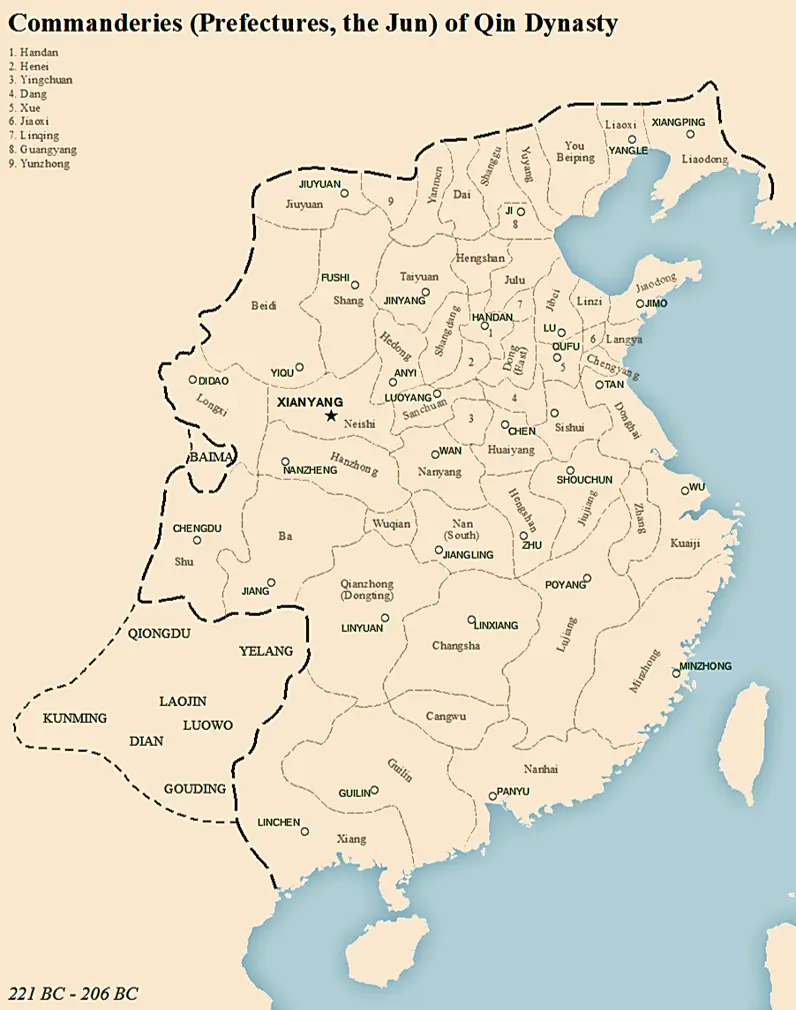
Map of the Qin dynasty and its administrative divisions (Wiki Image).
This statement accurately describes some key aspects of Qin Shi Huang’s early life and governance philosophy.
- Born into the Royal Family of Qin State: Qin Shi Huang, originally named Ying Zheng, was born into the royal family of the Qin state in 259 BC. The Qin state was a powerful kingdom located in northwestern China during the Warring States period.
- Ascended the Throne at a Young Age: After his father’s death, King Zhuangxiang Qin Shi Huang ascended to the throne of Qin at the age of 13. Despite his youth, he inherited the responsibilities of rulership and began his journey to unify China under his rule.
- Adopted the Philosophy of Legalism: Qin Shi Huang embraced Legalism as the guiding philosophy of his governance. Legalism emphasized strict laws, harsh punishments, and a centralized bureaucracy as essential tools for maintaining order and control within the state. Qin Shi Huang implemented Legalist principles to consolidate his power and enforce his authority over the newly unified empire.
Overall, Qin Shi Huang’s early life and adoption of Legalism played significant roles in shaping his reign as the first emperor of a unified China. His rule was characterized by authoritarian governance, centralized control, and the implementation of drastic reforms aimed at standardizing and centralizing the administration of the empire.
Qin Shi Huang conquered the six other warring states through a series of military campaigns, finally unifying China in 221 BCE.
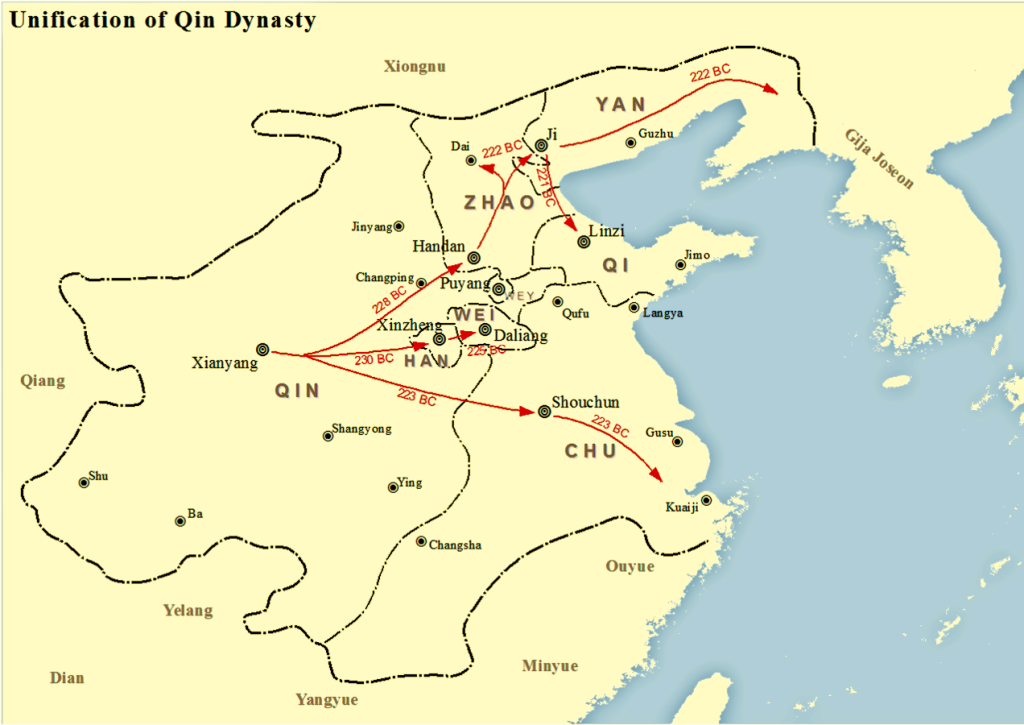
Qin’s unification of the Seven Warring States (Wiki Image).
Yes, that’s correct. Qin Shi Huang, the first emperor of China, is renowned for his role in unifying the seven warring states of ancient China during the period known as the Warring States period. Through military campaigns and strategic alliances, Qin Shi Huang successfully conquered the six other major states: Qi, Chu, Yan, Han, Zhao, and Wei.
Qin Shi Huang’s military campaigns were characterized by strategic brilliance and ruthless efficiency. He employed innovative tactics and technologies, such as crossbows, armored infantry, and siege warfare, to achieve victory over his rivals. Qin Shi Huang’s conquests ended centuries of conflict and fragmentation, establishing the Qin Dynasty as the ruling dynasty of a unified China.
The culmination of Qin Shi Huang’s conquests came in 221 BCE when he declared himself the first emperor of China and proclaimed the beginning of the Qin Dynasty. This marked the end of the Warring States period and the beginning of a new era of centralized imperial rule in China.
Qin Shi Huang’s achievement in unifying China laid the foundation for the subsequent development of Chinese civilization and culture. His reign ushered in a period of unprecedented centralization and standardization, shaping China’s political, social, and economic landscape for centuries to come.
Qin Shi Huang established a strong centralized government with appointed officials, replacing the old feudal system based on hereditary nobility.
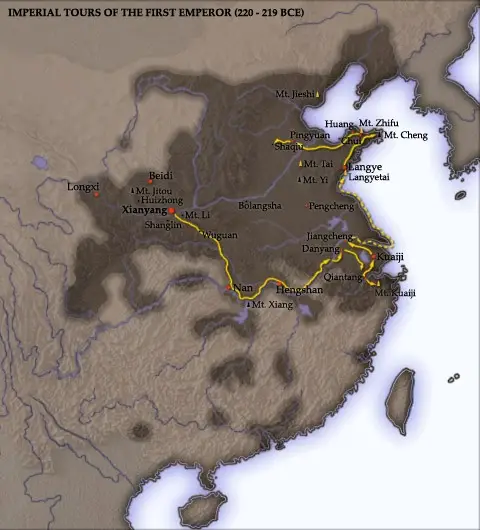
Imperial tours of Qin Shi Huang (Wiki Image).
That’s a great sentence summarizing a key aspect of Qin Shi Huang’s reign! Here are a few ways you can expand on it, depending on the desired direction:
Highlight the problems with the old system:
Qin Shi Huang established a strong centralized government with appointed officials, replacing the old feudal system based on hereditary nobility. The feudal system, where power rested with powerful, often warring, noble families, had led to centuries of instability and hindered national unity.
Emphasize the impact of the change:
Qin Shi Huang established a strong centralized government with appointed officials, replacing the old feudal system based on hereditary nobility. This shift dramatically reshaped China’s political landscape. Loyalty to the emperor, not birthright, became the key to power.
Connect it to his philosophy:
Qin Shi Huang established a strong centralized government with appointed officials, replacing the old feudal system based on hereditary nobility. This move embodied his embrace of Legalism, a philosophy emphasizing a strong central authority to maintain order and control.
Qin Shi Huang standardized weights and measures, writing systems, and even axle lengths of carts to facilitate trade and communication across the vast empire.
That’s a fantastic detail! Here are a few ways to expand on it, depending on the desired impact:
Focus on the practical benefits:
Qin Shi Huang standardized weights and measures, writing systems, and even axle lengths of carts. This seemingly mundane act had a profound impact on his vast empire. Merchants could now easily trade goods without confusion over quantities, while standardized carts ensured smooth travel on newly built roads. Communication also flourished with a unified writing system, fostering a sense of national identity across the far-flung territories.
Highlight the unifying power:
In a stroke of administrative genius, Qin Shi Huang standardized weights and measures, writing systems, and even cart axle lengths. This seemingly simple act transcended mere practicality and became a powerful symbol of unification, breaking regional barriers and forging a shared identity within the newly formed empire. From bustling marketplaces to dusty highways, standardization became the glue that held the vast Qin Dynasty together.
Connect it to his overall strategy:
Qin Shi Huang’s ruthless efficiency extended beyond military conquest. He standardized weights and measures, writing systems, and even axle lengths of carts. This meticulous approach wasn’t just about convenience; it was a calculated move to tighten his grip on the newly unified empire. Standardized trade practices funneled taxes to the central government, while a unified writing system ensured the smooth flow of imperial decrees across the vast territory. Even the standardized carts served a dual purpose: facilitating troop movements while reminding every citizen of the emperor’s far-reaching control.
Qin Shi Huang connected and expanded existing fortifications into the beginnings of the Great Wall of China, a massive project aimed at defending against nomadic incursions from the north.
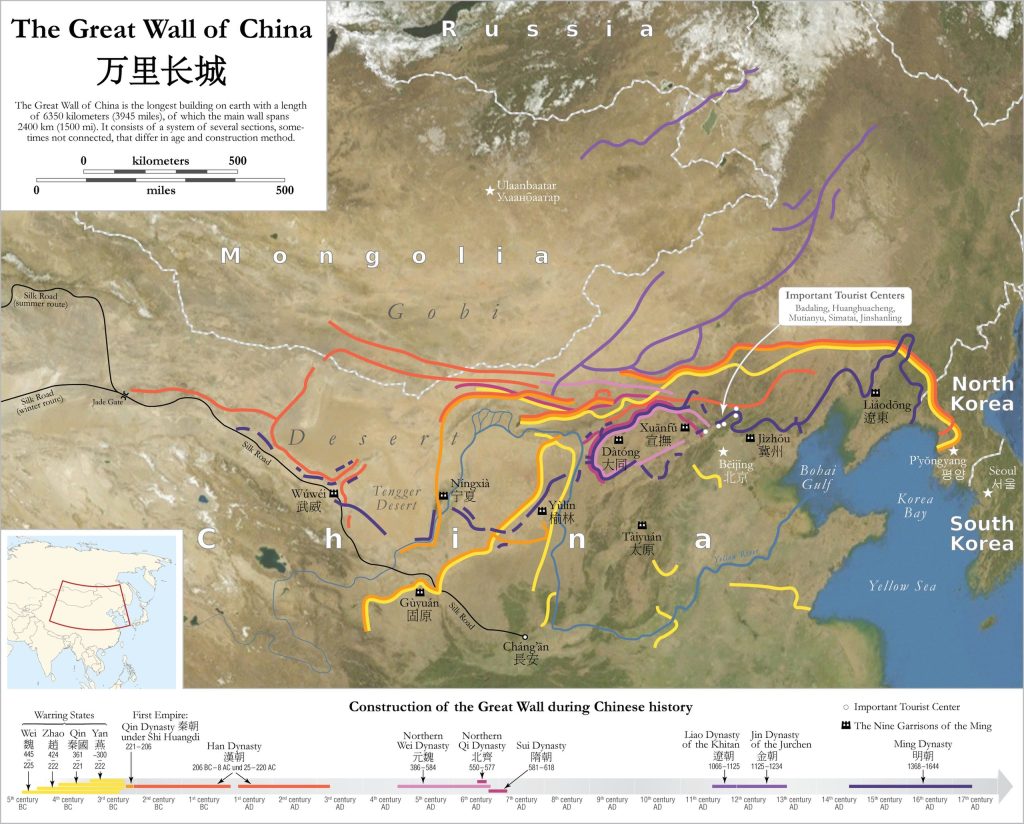
Map of all the wall constructions (Wiki Image).
That’s a great summary of Qin Shi Huang’s role in the Great Wall! Here are a few ways you can expand on it, depending on the desired tone:
Emphasize the scale of the project:
Qin Shi Huang connected and expanded existing fortifications into the beginnings of the Great Wall of China, a monumental project that would span thousands of miles across China’s northern frontier. This ambitious undertaking aimed to defend against the constant threat of nomadic incursions from the north.
Highlight the human cost:
Qin Shi Huang’s relentless ambition manifested in the Great Wall. He connected and expanded existing fortifications into a massive defensive barrier, stretching across China’s northern borders. This project, aimed at repelling nomadic raiders, came at a brutal human cost. Hundreds of thousands of laborers toiled under harsh conditions, many perishing in the process.
Focus on its strategic importance:
Recognizing the vulnerability of his newly unified empire, Qin Shi Huang embarked on a grand defensive project. He connected and expanded existing fortifications into the beginnings of the Great Wall of China. This formidable barrier, strategically positioned along the northern frontier, aimed to deter and repel nomadic incursions, a constant threat to China’s security.
Qin Shi Huang is infamous for the Burning of Books and Burying of Scholars, an attempt to suppress dissent and consolidate his rule. He targeted scholars and intellectuals associated with rival philosophies like Confucianism.
That’s a great summary of the Burning of Books and Burying of Scholars! Here are a few ways you can expand on it, depending on the desired direction:
Highlight the brutality:
A brutal act of intellectual suppression marred Qin Shi Huang’s reign: the Burning of Books and Burying of Scholars. He targeted scholars and intellectuals associated with rival philosophies like Confucianism to eliminate dissent and consolidate his absolute rule. Historians debated the exact scale of the event, but the message was clear – any ideology challenging the emperor’s authority would be ruthlessly crushed.
Focus on the impact on knowledge:
A dark stain on Chinese history, the Burning of Books and Burying of Scholars was a calculated act of cultural destruction. Qin Shi Huang ordered the burning of countless texts associated with rival schools of thought, from philosophy to history. This not only silenced dissent but also threatened to erase China’s intellectual heritage. Though some knowledge survived through oral tradition and hidden copies, the event marked a significant setback for intellectual discourse.
Connect it to his overall philosophy:
The Burning of Books and Burying of Scholars exemplified the ruthless efficiency of Qin Shi Huang’s reign. Fearing any ideology that could challenge his absolute rule, he targeted scholars and intellectuals associated with rival philosophies, particularly Confucianism, which emphasized social order through education and ethics. This act of suppression wasn’t just about eliminating dissent; it was about shaping the minds of his subjects and solidifying Legalism as the sole guiding principle of the empire.
Qin Shi Huang undertook massive construction projects, including his vast mausoleum, which is now home to the now-famous Terracotta Army. These projects involved forced labor, resulting in hardship and resentment among the general population.

Lifelike terracotta soldier statues from the Terracotta Army were discovered near modern Xi’an, intended to guard the Mausoleum of the First Qin Emperor (Wiki Image).
Yes, that’s correct. Qin Shi Huang undertook massive construction projects throughout his reign, including constructing his vast mausoleum complex near modern-day Xi’an. The most famous aspect of this mausoleum complex is the Terracotta Army, which comprises thousands of life-sized terracotta soldiers and horses buried alongside the emperor to protect him in the afterlife.
These construction projects, including the mausoleum and the Terracotta Army, were monumental undertakings that required vast resources and labor. Qin Shi Huang employed forced labor to complete these projects, conscripting thousands of laborers from the common people to work on construction sites under harsh conditions.
The use of forced labor resulted in widespread hardship and resentment among the common people. Many laborers were subjected to grueling work conditions, with long hours and minimal compensation. The demands of these construction projects placed a heavy burden on the populace, leading to discontent and unrest.
Despite the impressive scale and grandeur of the construction projects initiated by Qin Shi Huang, they also came at a significant cost to the welfare of the common people. The forced labor and hardship endured by the laborers involved in these projects are a testament to the authoritarian nature of Qin Shi Huang’s rule and the extent to which he was willing to exploit his subjects to fulfill his ambitious ambitions.
Overall, while Qin Shi Huang’s construction projects left a lasting legacy in terms of architectural and cultural achievements, they also had detrimental effects on the lives of the common people, contributing to resentment and dissatisfaction with his rule.
Qin Shi Huang was obsessed with finding the elixir of life, and he funded expeditions and experiments that likely contributed to his early death.
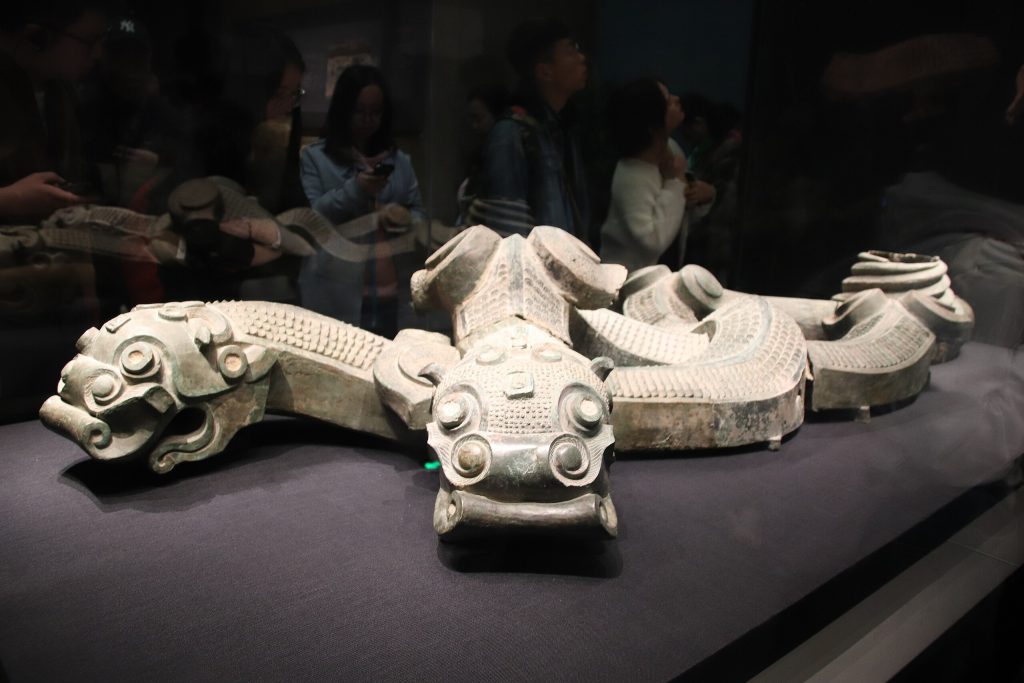
Qin dynasty twin bronze dragons, found near the Mausoleum of the First Qin Emperor (Wiki Image).
You’re right. Qin Shi Huang’s obsession with immortality is well documented. Here’s a breakdown of his quest for the elixir and the ironic twist:
- Expeditions: He sent out searches, such as one led by Xu Fu, to find the legendary Penglai Mountain, where the elixir was supposedly located. These expeditions never returned, possibly due to fear of failure or because they ultimately settled elsewhere, as some legends suggest about Japan.
- Experiments: Qin Shi Huang likely consumed concoctions containing substances like cinnabar (mercury sulfide), believing they held life-extending properties. Ironically, as we know today, mercury is highly toxic.
These pursuits likely contributed to his demise:
- Mercury Poisoning: The elixirs he consumed may have contained mercury, accelerating his death rather than preventing it.
- Stress of Obsession: His constant focus on finding a way to cheat death might have taken a toll on his mental and physical health.
While Qin Shi Huang achieved great things in unifying China, his pursuit of immortality proved to be a fatal flaw.
Qin Shi Huang’s legacy.
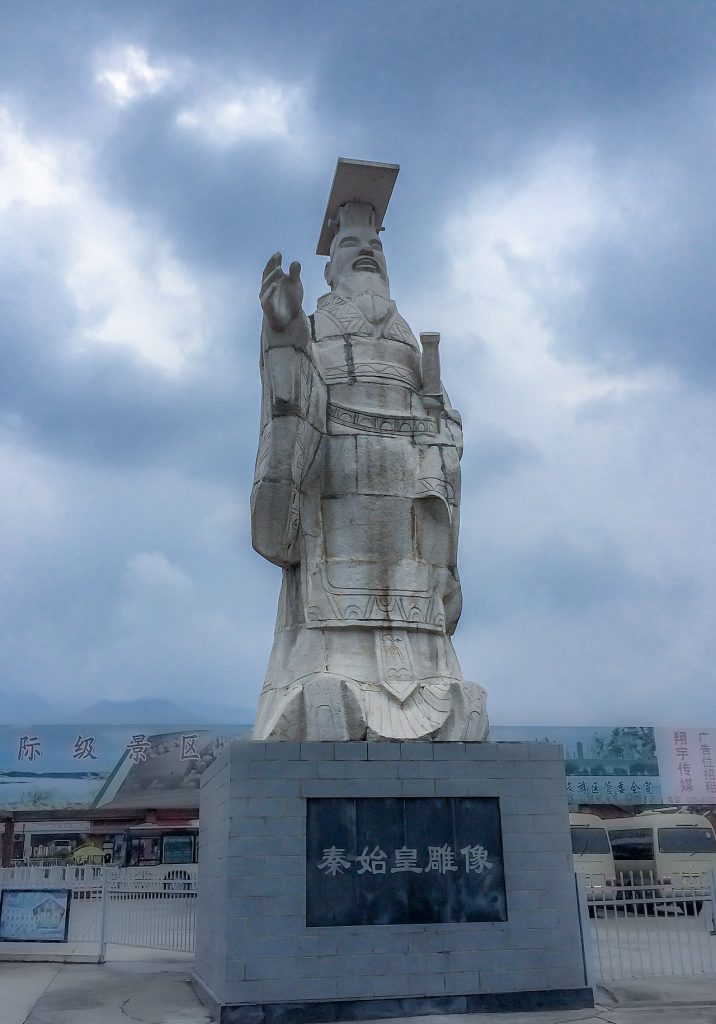
Statue of Emperor Qin Shi Huang in Handan (Wiki Image).
Qin Shi Huang’s legacy is complex and multifaceted, encompassing his achievements and the controversies surrounding his rule. Here are some key aspects of Qin Shi Huang’s legacy:
- Unification of China: Qin Shi Huang is best known for unifying China under his rule, ending centuries of conflict, and establishing the Qin Dynasty. His conquests and administrative reforms laid the foundation for the centralized imperial system that would characterize Chinese governance for centuries.
- Standardization: Qin Shi Huang implemented numerous reforms to standardize various aspects of Chinese society, including weights, measures, currency, and the writing system. These reforms helped to promote unity and facilitate governance across the newly unified empire.
- Infrastructure and Construction: Qin Shi Huang initiated ambitious construction projects, including the early stages of the Great Wall of China and his vast mausoleum complex guarded by the Terracotta Army. These projects left a lasting architectural legacy and are emblematic of the grandeur and ambition of his reign.
- Legalism and Authoritarianism: Qin Shi Huang adopted Legalism as the guiding philosophy of his governance, emphasizing strict laws, harsh punishments, and centralized control. His authoritarian rule and suppression of dissent have left a controversial legacy, with critics pointing to the brutality and repression associated with his reign.
- Cultural Impact: Despite his efforts to suppress rival philosophies and intellectual discourse, Qin Shi Huang’s reign contributed to developing Chinese culture and identity. His standardization efforts helped to create a sense of cultural unity, and the Terracotta Army remains one of the most iconic symbols of Chinese civilization.
- Controversies and Criticisms: Qin Shi Huang’s legacy is also marked by controversies and criticisms, including the burning of books and persecution of scholars, the use of forced labor, and the pursuit of the elixir of life. These actions have led to enduring debates about the ethics and consequences of his rule.
Overall, Qin Shi Huang’s legacy is characterized by his role as a unifier of China, his ambitious reforms and construction projects, his authoritarian rule, and his suppression of dissent. While he is celebrated for his achievements in unifying and shaping China, his legacy is also marked by controversies and ethical dilemmas that continue to provoke discussion and debate.
Augustus (Roman Empire)
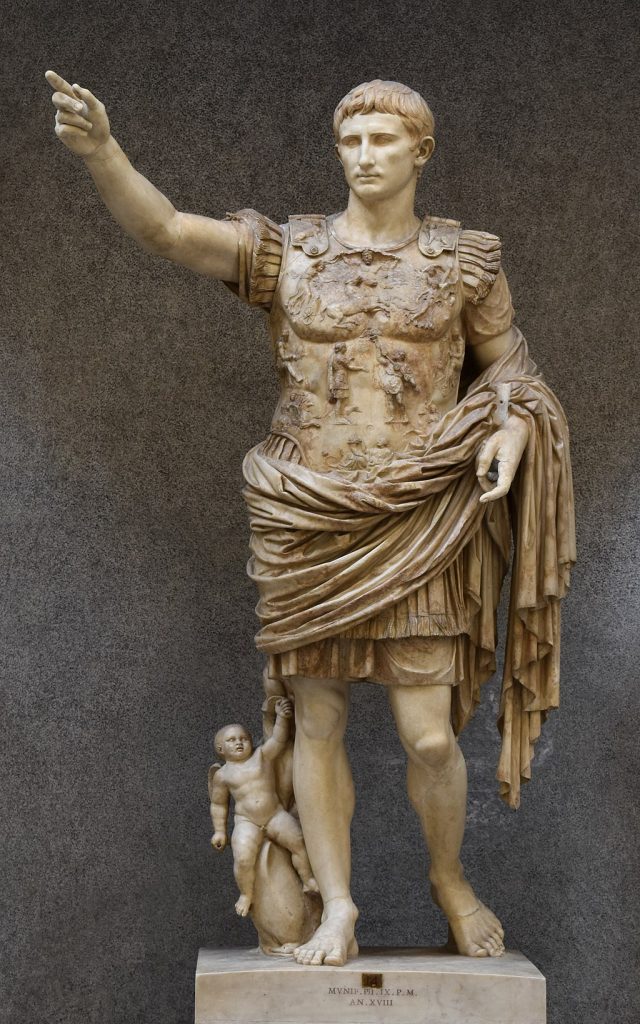
Princeps Augustus (Wiki Image).
Augustus Quotes
“I found Rome a city of bricks and left it a city of marble.”
“I endeavored to be not so much esteemed as feared.”
“Fate leads the willing and drags along the reluctant.”
“Make haste slowly.”
“I am not one of those who confine themselves to facts when expressing opinions.”
“The greatest rewards are reserved for those who bring great value to themselves and others.”
“Let us conduct ourselves so that all men wish to be our friends and all fear to be our enemies.” -Augustus.
Augustus YouTube Video Links Views
Here are some of the most popular and informative YouTube videos about Augustus, the first Roman Emperor, including documentaries and clips from historical dramas.
1. Augustus: Rome’s Greatest Emperor
- Views: 3,941,027
- Link: http://www.youtube.com/watch?v=Zw9le2od08k
- Description: From the popular “Biographics” channel, this video provides a comprehensive and engaging overview of Augustus’s life, his rise to power, and his lasting legacy as the founder of the Roman Empire.
2. History vs. Augustus – Peta Greenfield & Alex Gendler
- Views: 2,349,102
- Link: http://www.youtube.com/watch?v=QrcmojhFmzY
- Description: A highly engaging animated TED-Ed video that examines the complex legacy of Augustus, posing the question of whether he was a brilliant statesman or a destroyer of the Republic. It’s an excellent critical analysis.
3. Cleopatra and Octavian Meet in “Rome”
- Views: 1,646,541
- Link: http://www.youtube.com/watch?v=599AzvrUqo0
- Description: A dramatic clip from the acclaimed HBO series “Rome,” depicting the famous meeting between Octavian (Augustus before his official title) and Cleopatra after the Battle of Actium. While fictionalized, it serves as a popular visual representation of a key historical moment.
4. Rome (HBO) – Octavian explains the situation to Lucius and Pullo HD
- Views: 713,117
- Link: http://www.youtube.com/watch?v=HWdtPy4fQ6U
- Description: Another popular clip from the HBO series, this scene shows Octavian (Augustus) explaining his political maneuvering and strategic thinking to the common soldiers, offering insight into his pragmatic genius.
5. Rome (HBO) – Octavian’s Speech to the Senate
- Views: 642,319
- Link: http://www.youtube.com/watch?v=PbMKc17EtGI
- Description: This clip from HBO’s “Rome” dramatically portrays Octavian’s powerful speech to the Senate, a pivotal moment in his consolidation of power and the transition from Republic to Empire.
Augustus Books
For a single, definitive book on Augustus, the first Roman Emperor, the best modern choice is “Augustus: The Life of Rome’s First Emperor” by Adrian Goldsworthy.
The reign of Augustus is a pivotal moment in Western history, and the literature about him is extensive. Here are some of the most essential and highly-regarded books for understanding his life and impact.
The Definitive Modern Biography 👑
“Augustus: The Life of Rome’s First Emperor” by Adrian Goldsworthy
From the same author as the acclaimed biography of Caesar, this is the most comprehensive and authoritative modern account of Augustus’s life. Goldsworthy details his ruthless rise to power as Octavian, his political genius in transforming the Roman state while preserving the illusion of the Republic, and his long reign that established the Pax Romana. It is a well-paced and highly readable narrative.
The Essential Primary Sources 📜
“The Twelve Caesars” by Suetonius
Written about a century after Augustus’s death, Suetonius’s biography of Augustus (the second of the twelve Caesars in the book) is an indispensable and entertaining source. While it’s filled with gossip and personal anecdotes, it provides a unique contemporary perspective on the emperor’s character, habits, and family life.
“The Deeds of the Divine Augustus” (Res Gestae Divi Augusti) by Augustus
This is Augustus’s own account of his life and accomplishments. Inscribed on bronze tablets in front of his mausoleum, it is a masterful piece of political propaganda in which he presents his version of his rise to power and his achievements as the restorer of the Republic. It is a crucial document for understanding how Augustus wanted to be remembered.
For a Broader Historical Context
“The Roman Revolution” by Ronald Syme
This is a classic and highly influential work of 20th-century history. Syme’s book is not a traditional biography but a powerful analysis of the social and political transformation of the Roman ruling class during the death of the Republic and the rise of Augustus. It’s a more academic work that argues that Augustus’s rise was a violent revolution that replaced an old oligarchy with a new one under his autocratic rule.
Augustus History
Augustus, born Gaius Octavius Thurinus on September 23, 63 BC, was the first Roman emperor, ruling from 27 BC until he died in 14 AD. He was the adopted son and heir of Julius Caesar, his great-uncle, and rose to power after Caesar’s assassination in 44 BC.
After Caesar’s assassination in 44 BC, Augustus emerged as one of the leading figures in the subsequent power struggle. He defeated his rivals in a series of civil wars, culminating in his victory over Mark Antony and Cleopatra at the Battle of Actium in 31 BC.
In 27 BC, Augustus was granted the title of princeps, which means “first citizen.” This title gave him great power, but he carefully maintained the illusion of a republic. He restored many of the traditional institutions of the Roman Republic, and he avoided taking on the title of king or dictator.
Augustus’ reign was marked by relative peace and prosperity, and he initiated many reforms that helped to stabilize the Roman Empire. He also undertook several building projects, including the Temple of Apollo and the Pantheon, which helped to beautify Rome and enhance its prestige.
Augustus was a shrewd politician and a skilled diplomat. He united the Roman people after the chaos of the civil wars and established a stable and prosperous government that lasted for over two centuries. He is considered one of the greatest Roman emperors, and his reign is often referred to as the Pax Romana or Roman Peace.
Here are some of Augustus’ most notable achievements:
- Established the Principate: Augustus established a new political system, the Principate, which combined elements of a monarchy and a republic. This system allowed him to maintain his power while preserving some of the institutions of the Roman Republic.
- Restored peace and stability: Augustus ended the civil wars that had plagued Rome for decades, bringing peace and stability to the empire. This allowed the empire to prosper and grow.
- Initiated reforms: Augustus implemented several reforms that significantly improved the lives of Roman citizens. These reforms included the establishment of a professional standing army, the creation of a new judicial system, and the implementation of numerous social welfare programs.
- Undertook building projects: Augustus undertook several projects that helped beautify Rome and enhance its prestige. These projects included the Temple of Apollo, the Pantheon, and the Roman Forum.
- Promoted arts and culture: Augustus patronized the arts and culture. He encouraged the development of poetry, literature, and the arts, including sculpture. He also built many public libraries and theaters.
Augustus’ legacy is complex and multifaceted. He was a brilliant politician and a skilled diplomat, but he was also a ruthless dictator who eliminated his rivals and suppressed dissent. Nevertheless, his reign was a period of great peace and prosperity for the Roman Empire, and he is considered one of the greatest Roman emperors.
Augustus was the adopted son and heir of Julius Caesar, his great-uncle, and rose to power after Caesar’s assassination in 44 BC.
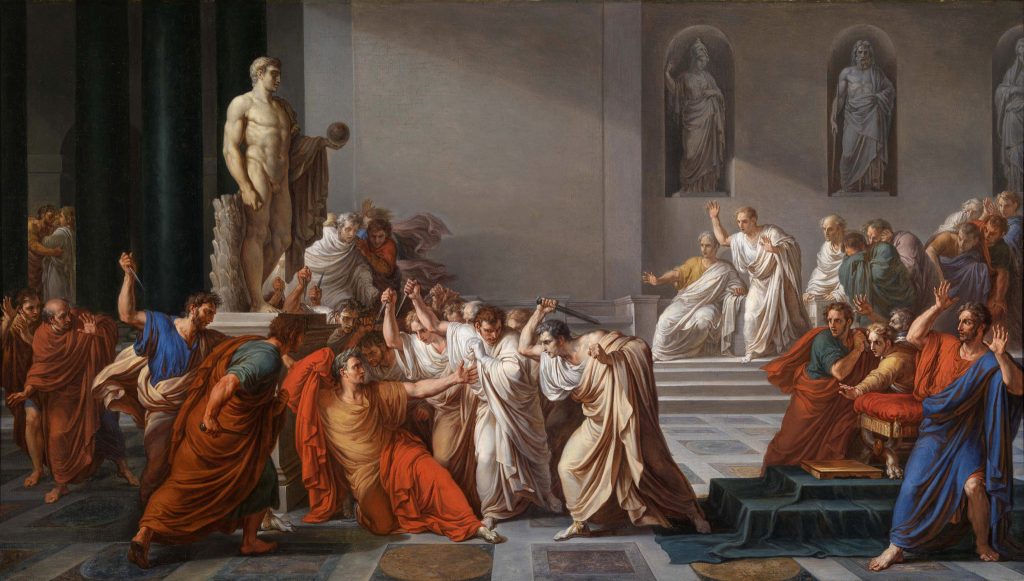
The Death of Caesar by Vincenzo Camuccini. On 15 March 44 BC, Octavius’s adoptive father, Julius Caesar, was assassinated by a conspiracy led by Marcus Junius Brutus and Gaius Cassius Longinus. Galleria Nazionale d’Arte Moderna, Rome (Wiki Image).
Augustus, originally named Gaius Octavius Thurinus, was the adopted son and heir of Julius Caesar, his great-uncle. Following Caesar’s assassination in 44 BC, Augustus emerged as a key figure in the ensuing power struggle.
Caesar’s will had named Augustus his heir, granting him a significant political advantage. Augustus, then only 18 years old, allied himself with Mark Antony, one of Caesar’s most trusted lieutenants. They defeated Caesar’s assassins, Brutus and Cassius, at the Battle of Philippi in 42 BC.
However, the alliance between Augustus and Antony soon deteriorated, leading to a rivalry that culminated in a civil war. In 31 BC, Augustus and his forces defeated Antony and Cleopatra, the Queen of Egypt, at the Battle of Actium. With this victory, Augustus emerged as the sole ruler of Rome.
Battle of Actium in 31 BC.
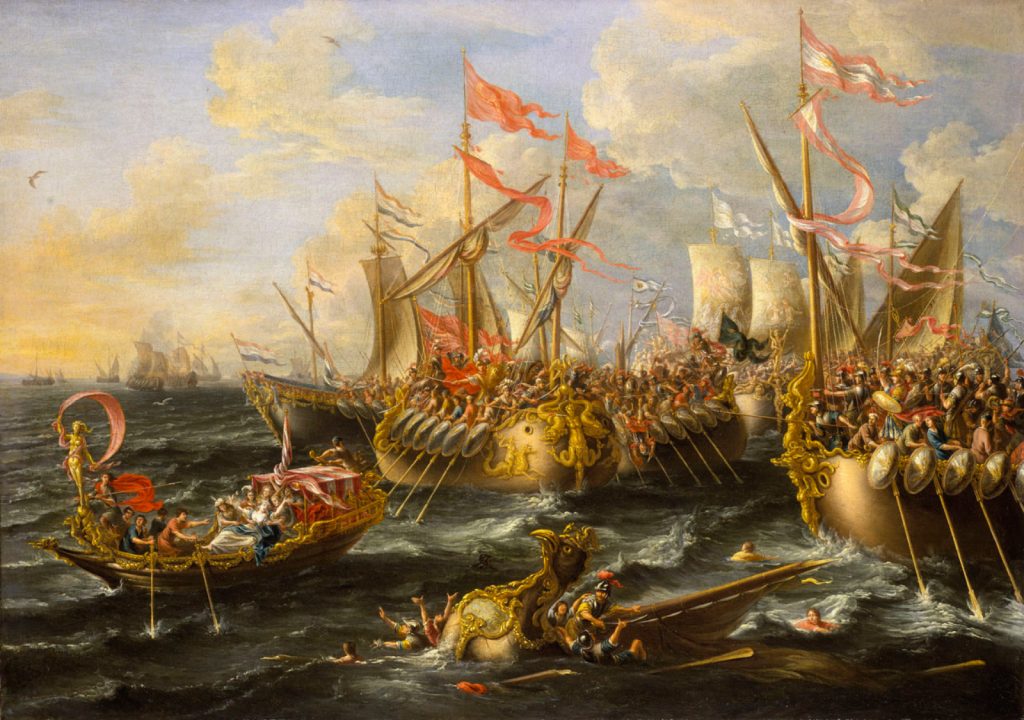 The Battle of Actium, by Laureys a Castro, painted 1672, National Maritime Museum, London (Wiki Image).
The Battle of Actium, by Laureys a Castro, painted 1672, National Maritime Museum, London (Wiki Image).
Sure, here is a summary of the Battle of Actium:
The Battle of Actium was a pivotal naval engagement in the Ionian Sea on September 2, 31 BC, near the former Roman colony of Actium, Greece. It marked the culmination of a decade-long power struggle between Octavian, the adopted son of Julius Caesar, and Mark Antony, Caesar’s former lieutenant and lover of Cleopatra VII Philopator, Queen of Egypt.
Background
Following Julius Caesar’s assassination in 44 BC, Rome plunged into a period of civil war. Octavian, Caesar’s adopted son, allied himself with Mark Antony, one of Caesar’s trusted lieutenants, to defeat Caesar’s assassins, Brutus and Cassius. However, the alliance between Octavian and Antony soon deteriorated, leading to a rivalry that intensified over the years.
Antony’s decision to form a romantic alliance with Cleopatra, Queen of Egypt, further strained his relationship with Octavian and the Roman Senate. Cleopatra’s wealth and strategic location in the eastern Mediterranean potentially threaten Rome’s dominance.
In 32 BC, Octavian declared war on Cleopatra, effectively making it a war against Antony. Antony and Cleopatra amassed a large fleet and army, hoping to defeat Octavian and seize control of Rome.
The Battle
The Battle of Actium took place on September 2, 31 BC, off the coast of western Greece. Octavian’s fleet, led by his trusted general Marcus Agrippa, faced Antony’s and Cleopatra’s combined forces.
Octavian’s fleet adopted a more agile and aggressive strategy, using grappling hooks to disable Antony’s larger but less maneuverable ships. The battle raged for several hours, with both sides suffering heavy casualties.
As the battle progressed, Antony and Cleopatra, fearing defeat, abandoned their forces and fled to Egypt. Their desertion demoralized their remaining troops, leading to Octavian’s decisive victory.
Aftermath
The Battle of Actium marked a turning point in Roman history. Octavian emerged as the sole ruler of Rome, effectively ending the Roman Republic and ushering in the era of the Roman Empire.
Octavian, later known as Augustus, was the first Roman emperor from 27 BC until his death in 14 AD. His reign was characterized by peace, prosperity, and cultural flourishing, known as the Pax Romana or “Roman Peace.”
Antony and Cleopatra committed suicide shortly after their defeat. Egypt became a Roman province with their deaths, further consolidating Octavian’s power and control over the Mediterranean world.
The Battle of Actium profoundly impacted the course of Roman history. It marked the end of the Roman Republic and the beginning of the Roman Empire, shaping the political landscape and cultural legacy of the ancient world.
Augustus established a new political system, the Principate, which combined elements of monarchy and republicanism.
The first Roman emperor, Augustus, established a new political system, the Principate, a clever blend of monarchical and republican elements. This system allowed Augustus to maintain considerable power while preserving the illusion of a republic, appeasing the Roman people accustomed to a republican form of government.
Key Features of the Principate
- Princeps: Augustus held the title of princeps, which means “first citizen.” This title granted him significant authority, including the command of the army, the appointment of officials, and the initiation of legislation.
- Preservation of Republican Institutions: Augustus maintained many of the traditional institutions of the Roman Republic, including the Senate, assemblies, and magistrates. However, these institutions gradually lost their power, and Augustus effectively became the sole ruler of Rome.
- Respect for Republican Traditions: Augustus carefully cultivated an image as a protector of the republic, often emphasizing his commitment to republican values and traditions. This helped to legitimize his rule and reduce opposition from the Roman populace.
Advantages of the Principate
- Stability and Peace: The Principate ended the century-long civil wars that plagued Rome. This stability allowed for economic growth, cultural flourishing, and territorial expansion.
- Effective Administration: Augustus implemented numerous reforms that enhanced the administration of the Roman Empire, including the creation of a professional bureaucracy and the establishment of a standing army.
- Cultural Advancement: The Pax Romana, the period of peace under Augustus’ rule, fostered a flourishing of arts, literature, and architecture, contributing to Rome’s cultural legacy.
Challenges of the Principate
- Concentration of Power: While Augustus maintained the illusion of a republic, the Principate was essentially a monarchy. This concentration of power could lead to abuse and corruption.
- Succession Issues: Augustus carefully planned his succession, but the lack of clear guidelines for future emperors could lead to instability and power struggles.
- Gradual Erosion of Republican Institutions: Preserving republican institutions under the Principate was largely symbolic. Over time, these institutions lost their power, and the emperor became the undisputed ruler of Rome.
Overall Assessment
The Principate, established by Augustus, was a complex and innovative political system that combined elements of monarchy and republic. It brought stability and prosperity to Rome after a century of civil wars, but it also laid the groundwork for the eventual transformation of the republic into an autocratic empire.
Augustus ended the civil wars that had plagued Rome for decades, bringing peace and stability to the empire.
Augustus, the first Roman emperor, played a pivotal role in ending the civil wars ravaging Rome for decades. His victory at the Battle of Actium in 31 BC marked the culmination of a long and arduous power struggle, and his subsequent reign ushered in a period of peace and stability known as the Pax Romana or “Roman Peace.”
The Background of the Civil War
Following Julius Caesar’s assassination in 44 BC, Rome was plunged into a period of political turmoil and civil war. Various factions vying for power clashed in bloody conflicts threatening to tear the empire apart. Octavian, Caesar’s adopted son and heir, emerged as one of the key figures in this power struggle.
The Rise of Augustus
Octavian gradually consolidated his power through strategic alliances and military prowess. He formed a triumvirate with Mark Antony and Lepidus, but this alliance soon dissolved, leading to a rivalry between Octavian and Antony.
The Battle of Actium, fought in 31 BC, marked the decisive moment in Octavian’s rise to power. His fleet, led by the skilled general Agrippa, defeated Antony and Cleopatra’s combined forces, effectively ending the civil wars.
The Pax Romana
With his victory at Actium, Octavian emerged as the sole ruler of Rome. He carefully crafted his image as a protector of the republic while maintaining a significant amount of power. He established the Principate, a new political system that combined elements of monarchy and republic.
Under Augustus’ rule, Rome enjoyed a remarkable period of peace and stability known as the Pax Romana. This period lasted over 200 years and allowed for economic growth, cultural flourishing, and territorial expansion.
Augustus’ Achievements
Significant reforms and achievements marked Augustus’ reign. He improved the infrastructure, taxation system, and administration of justice. He also patronized the arts and literature, contributing to a flourishing cultural period.
Augustus’ legacy as the first Roman emperor is profound. He brought stability to a war-torn empire, initiated a period of cultural and economic prosperity, and laid the foundations for the Roman Empire’s enduring legacy.
Augustus’ Battle of the Teutoburg Forest.
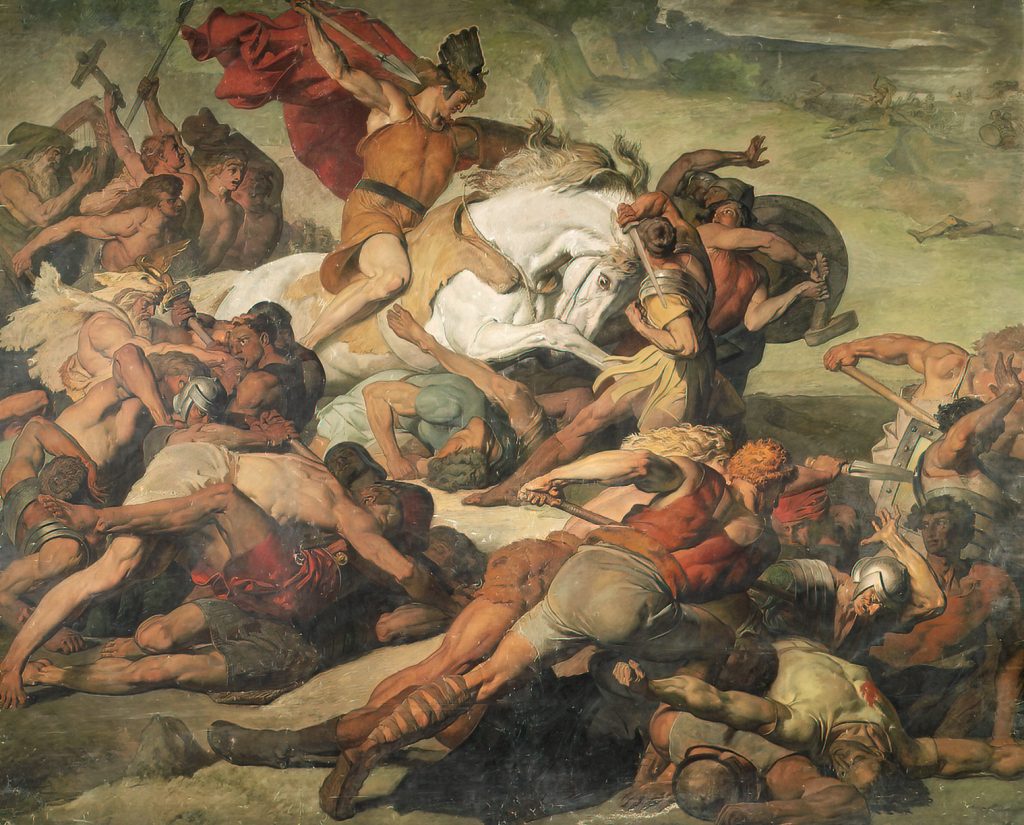
The Victorious Advancing Hermann, depiction of the Battle of the Teutoburg Forest, by Peter Janssen, 1873 (Wiki Image).
The loss of three Roman legions under the command of Publius Quinctilius Varus at the Battle of the Teutoburg Forest in 9 AD was a catastrophic event for the Roman Empire. The legions, Legio XVII, Legio XVIII, and Legio XIX, were completely annihilated by a Germanic alliance led by Arminius, a Cheruscan chieftain who had served in the Roman army.
The defeat was a major blow to Roman prestige and power, marking the end of the empire’s expansion into northern Europe. The Romans never regained control of Germany, and the battle is considered one of the most significant military defeats in Roman history.
Background to the Battle
In 9 AD, Varus was appointed governor of Germany, a vast territory that included present-day Germany, the Netherlands, and parts of Belgium. Varus, a politician rather than a military man, underestimated the strength of the Germanic tribes and made several strategic blunders that ultimately led to his defeat.
The Battle of the Teutoburg Forest
In the summer of 9 AD, Varus and his legions marched through the Teutoburg Forest when Arminius and his allies ambushed them. The Germans utilized their knowledge of the terrain to their advantage, enabling them to overwhelm the Romans in skirmishes.
The Romans were completely routed, and very few of them managed to escape. Varus himself committed suicide, and the three legions were wiped out. The battle was a complete victory for the Germanic tribes, marking the end of Roman rule in Germany.
Aftermath of the Battle
The loss of the three legions was a major shock to the Roman Empire. The emperor, Augustus, was reportedly so distraught by the news that he tore his clothes and banged his head against a wall. The battle also significantly impacted Roman military strategy, leading to a more cautious approach to expansion in northern Europe.
The Battle of the Teutoburg Forest is a reminder of the fragility of power and the importance of not underestimating one’s enemies. It is also a testament to the resilience of the Germanic tribes, who united and defeated a powerful Roman army.
Augustus initiated several reforms that significantly improved the lives of Roman citizens.
Augustus, the first Roman emperor, initiated a series of reforms aimed at improving the lives of Roman citizens and strengthening the empire. These reforms affected various aspects of Roman society, including infrastructure, taxation, social welfare, and cultural development.
Infrastructure and Public Works
Augustus recognized the importance of a well-developed infrastructure for sustaining a vast and interconnected empire. He embarked on an extensive program of public works, constructing and repairing roads, bridges, aqueducts, and public buildings. These improvements enhanced trade, facilitated communication, and gave citizens access to clean water and essential services.
Taxation System
Augustus instituted reforms to streamline the taxation system, making it more fair and efficient. He introduced a standardized tax code, established a central tax administration, and implemented measures to prevent tax evasion. These reforms improved the government’s revenue collection and reduced the burden on individual taxpayers.
Social Welfare and Public Services
Augustus enacted measures to address social issues and provide essential services to Roman citizens. He established a system of grain subsidies to ensure a steady food supply for the poor, particularly in urban areas. He also initiated public assistance programs for orphans, the disabled, and veterans.
Cultural Development and Arts
Augustus recognized the value of culture and the arts in promoting civic pride and inspiring future generations. He patronized poets, historians, and artists, fostering a flourishing cultural environment. He commissioned public buildings adorned with sculptures and monuments and promoted the development of Roman literature and architecture.
Overall Impact
Augustus’ reforms had a significant impact on the lives of Roman citizens. They improved living standards, provided essential services, promoted cultural development, and instilled a sense of stability and progress. These reforms contributed to the Pax Romana, the period of peace and prosperity that marked Augustus’ reign.
Augustus’ legacy as a reformer extends beyond the specific measures he implemented. He established a framework for effective governance, emphasizing a balance between power and responsibility. His reforms laid the foundation for the continued development and prosperity of the Roman Empire.
Augustus undertook several projects that helped beautify Rome and enhance its prestige.
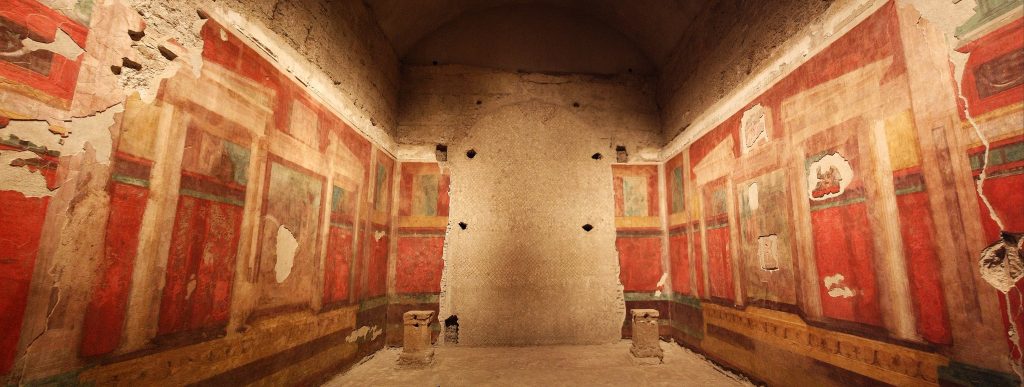 Fresco paintings inside the House of Augustus, his residence during his reign as emperor (Wiki Image).
Fresco paintings inside the House of Augustus, his residence during his reign as emperor (Wiki Image).
Augustus, the first Roman emperor, initiated several ambitious projects that transformed Rome into a magnificent and prestigious capital city. His efforts to beautify Rome reflected his desire to showcase the empire’s power and grandeur while also enhancing the lives of its citizens.
Architectural Marvels
Augustus embarked on a large-scale construction program, erecting numerous public buildings and monuments that reshaped the Roman landscape. He initiated the restoration of the Forum Romanum, the heart of Roman public life, and adorned it with impressive temples, basilicas, and courthouses. He constructed the Theatre of Marcellus, a vast entertainment venue, and the Mausoleum of Augustus, an imposing tomb that symbolized his authority.
Temples and Religious Places
Augustus recognized the importance of religion in Roman society and undertook several projects to enhance the city’s religious infrastructure. He rebuilt the Temple of Jupiter Capitolinus, the sacred center of Roman religion, and constructed the Temple of Apollo Palatinus, dedicated to his patron god. He also initiated the restoration of various other temples and shrines, demonstrating his respect for Roman religious traditions.
Public Spaces and Amenities
Augustus sought to improve Rome’s livability by creating functional and aesthetically pleasing public spaces. He constructed porticos, colonnaded walkways that provided shelter from the sun and rain, and embellished them with statues and fountains. He also created parks and gardens, offering tranquil oases amidst the bustling city.
Patronage of the Arts
Augustus understood the role of art in shaping a city’s cultural identity and actively patronized artists and intellectuals. He commissioned works of sculpture, painting, and literature, promoting a new era of Roman art that reflected the grandeur and stability of his reign.
Overall Impact
Augustus’ efforts to beautify Rome profoundly impacted the city’s appearance and reputation. He transformed Rome into a dazzling metropolis, showcasing the empire’s wealth, power, and cultural refinement. His contributions to architecture, public spaces, and the arts left an enduring legacy that inspires and fascinates visitors worldwide.
Augustus patronized the arts and culture. He encouraged the development of poetry, literature, and the arts, including sculpture.
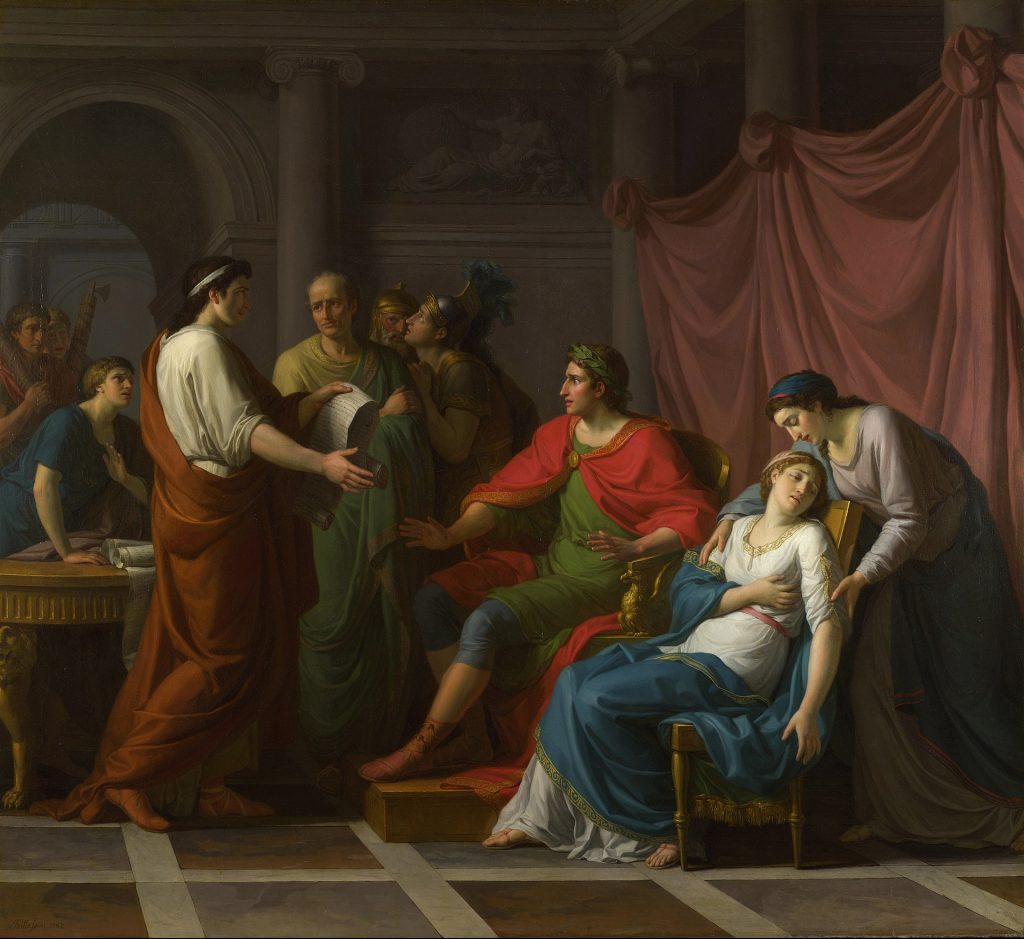
Virgil reading the Aeneid to Augustus and Octavia, by Jean-Joseph Taillasson, 1787 (Wiki Image).
Augustus, the first Roman emperor, recognized the power of the arts and culture to shape societal values, promote civic pride, and inspire future generations. He fostered a flourishing cultural environment during his reign, actively patronizing poets, historians, and artists.
Patronage of Literature
Augustus recognized the importance of literature in preserving history, expressing cultural identity, and imparting moral values. He encouraged the development of Roman literature, supporting poets and historians who produced works that celebrated his reign, promoted traditional Roman virtues, and explored themes of love, loss, and the human condition.
Virgil’s Aeneid
Augustus’ patronage of Virgil, a renowned poet, resulted in the creation of the Aeneid, an epic poem that became a cornerstone of Roman literature. The Aeneid narrates the legendary journey of Aeneas, a Trojan hero destined to found Rome, emphasizing the connection between Rome’s glorious past and its imperial present.
Horace’s Odes
Augustus also supported Horace, a gifted lyricist and satirist whose Odes celebrated the Pax Romana, the peace and prosperity that marked Augustus’ reign. Horace’s poetry explored themes of friendship, love, and the Roman way of life, capturing the era’s spirit.
Livy’s History
Livy, a prominent historian, received Augustus’ patronage in writing his extensive work, Ab Urbe Condita, which chronicles the history of Rome from its legendary founding to the reign of Augustus. Livy’s work instilled a sense of national pride and historical continuity among Roman citizens.
Patronage of Visual Arts
Augustus extended his patronage to the visual arts, encouraging the creation of sculptures, paintings, and reliefs that commemorated his achievements and glorified the Roman Empire. He adorned public buildings with impressive statues and commissioned triumphal arches to celebrate his victories.
Ara Pacis
The Ara Pacis, or Altar of Peace, is a testament to Augustus’ patronage of the arts. This finely sculpted marble altar, dedicated to Pax Romana, features intricate reliefs that depict the imperial family, magistrates, and citizens, commemorating a period of stability and prosperity.
Impact on Roman Culture
Augustus’ patronage of the arts and culture left an indelible mark on Roman society. His support for poets, historians, and artists enriched Roman literature, historical understanding, and artistic expression. The works produced during his reign contributed to the cultural flourishing of the Pax Romana, shaping the empire’s intellectual and artistic legacy.
Augustus’ legacy as a patron of the arts underscores his recognition of their importance in shaping a nation’s identity, preserving its history, and inspiring its citizens. His patronage contributed to the creation of enduring works of literature, art, and historical scholarship that continue to be studied and admired centuries later.
George Washington (Democracy)
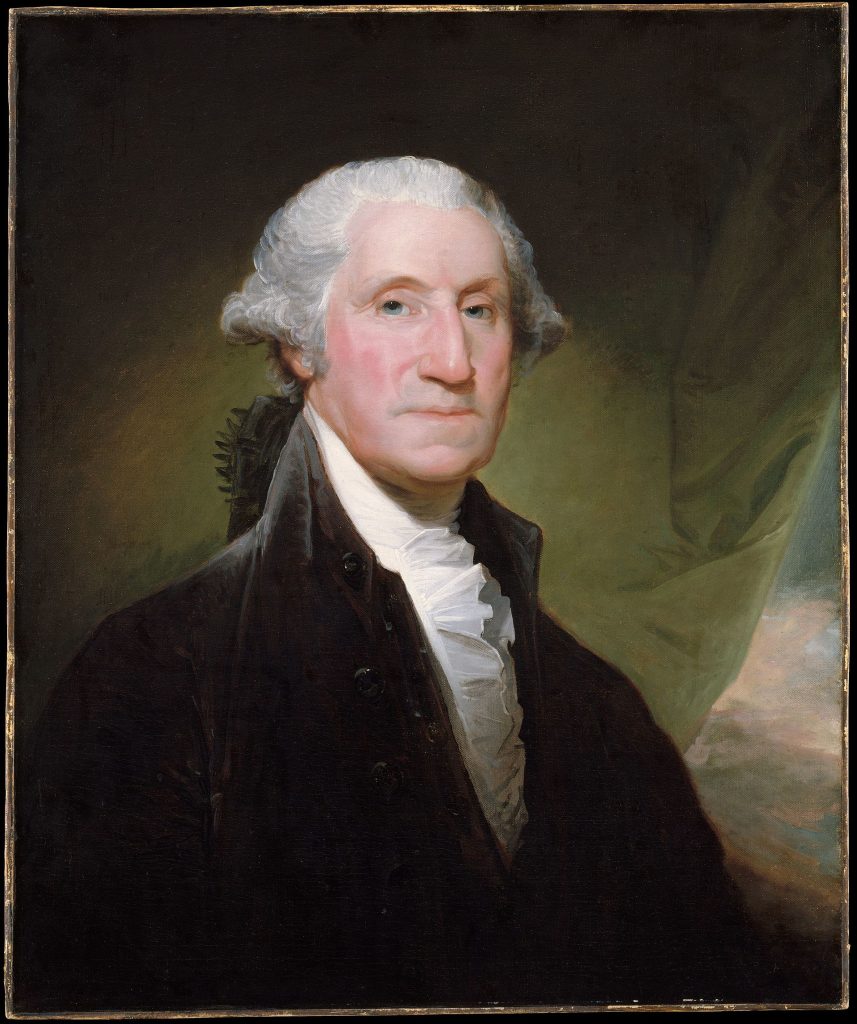
President George Washington (Wiki Image).
George Washington Quotes
“Associate yourself with men of good quality if you esteem your own reputation; for ’tis better to be alone than in bad company.”
“Happiness and moral duty are inseparably connected.”
“It is better to offer no excuse than a bad one.”
“Observe good faith and justice toward all nations. Cultivate peace and harmony with all.”
“Guard against the impostures of pretended patriotism.”
“Perseverance and spirit have done wonders in all ages.”
“Labor to keep alive in your breast that little spark of celestial fire called conscience.”
“The government of the United States has been emphatically termed a government of the people, by the people, and for the people.” – George Washington.
George Washington YouTube Video Links Views
Here are some of the most popular and informative YouTube videos about George Washington, including documentaries and tours of his Mount Vernon estate.
1. The Home & Estate of George Washington | History Traveler Episode 121
- Views: 1,784,214
- Link: http://www.youtube.com/watch?v=qfho2uZN_CM
- Description: This highly-viewed video from “The History Underground” offers an in-depth tour of Mount Vernon, George Washington’s iconic home and estate, providing a look at his private life and the environment he cultivated.
2. George Washington – First President of the United States Documentary
- Views: 1,627,822
- Link: http://www.youtube.com/watch?v=BcQyMVSL73w
- Description: From “The People Profiles,” this comprehensive documentary covers Washington’s entire life, from his military career and leadership during the Revolution to his presidency and the establishment of the American republic.
3. “George Washington” (1984) – Complete George Washington Biographic Mini-Series
- Views: 1,207,940
- Link: http://www.youtube.com/watch?v=SkCa7GXXxTY
- Description: This video provides the full 1984 biographical mini-series, offering a dramatic and detailed portrayal of Washington’s life.
4. George Washington – First U.S. President | Mini Bio | BIO
- Views: 582,522
- Link: http://www.youtube.com/watch?v=hvE9fb–Dig
- Description: A concise yet informative mini-biography from the “Biography” channel, covering the key events and achievements of America’s first president.
5. George Washington: America’s Founding Father
- Views: 562,332
- Link: http://www.youtube.com/watch?v=Ya3AwS_pLgQ
- Description: This video from “Biographics” provides an engaging and well-narrated account of George Washington’s pivotal role in the founding of the United States.
George Washington Books
For a single, definitive book on George Washington, the best modern choice is the Pulitzer Prize-winning “Washington: A Life” by Ron Chernow.
The number of books on America’s first president is immense. Here are some of the most essential and highly-regarded options for understanding his life and legacy.
The Definitive Modern Biography 🇺🇸
“Washington: A Life” by Ron Chernow
This is the definitive modern biography and the best starting point for most readers. Chernow’s Pulitzer Prize-winning work is a comprehensive and deeply human portrait of Washington, capturing his ambition, his leadership, and his complex inner life. It masterfully covers his entire career, from his early military failures to his command during the Revolution and his indispensable role as the first president.
The Classic Multi-Volume Biography
“George Washington: A Biography” (7 volumes) by Douglas Southall Freeman
For readers who want the most detailed account possible, Freeman’s seven-volume biography is a monumental classic of historical writing. Completed in the 1950s (with the final volume by his associates), it is an incredibly in-depth, “life and times” narrative that meticulously documents nearly every aspect of Washington’s career.
For a Focus on His Military Genius
“Washington’s Crossing” by David Hackett Fischer
This Pulitzer Prize-winning book focuses on a pivotal moment of the American Revolution: Washington’s daring crossing of the Delaware River and the subsequent battles of Trenton and Princeton. It is a brilliant work of military history that shows Washington not as a marble statue, but as a resilient and innovative commander facing the real possibility of catastrophic defeat.
In His Own Words 📜
“George Washington’s Writings” (Library of America edition)
This collection of Washington’s letters, diaries, and public addresses is the best primary source for understanding his own thoughts. Reading his own words provides direct insight into his concerns, his evolving views on slavery, his strategic thinking, and the principles that guided his leadership.
George Washington History
George Washington was an American politician and military leader who served as the first president of the United States from 1789 to 1797. He played a pivotal role in the American Revolution, leading the Continental Army to victory over the British forces. Washington is widely regarded as one of the United States’ Founding Fathers and considered one of American history’s most important figures.
Early Life and Military Career
George Washington was born in Westmoreland County, Virginia, on February 22, 1732. He was the eldest son of Augustine Washington, a wealthy planter, and Mary Ball Washington. Washington received a basic education and spent much of his youth working on the family farm.
In 1752, Washington was appointed an adjutant general for the Virginia militia during the French and Indian War. He served in several campaigns and gained valuable military experience. After the war, Washington returned to Virginia and became a successful planter and businessman.
American Revolution
In 1774, Washington was elected to the First Continental Congress, convened to address grievances with the British government. He was subsequently appointed a general in the Continental Army, tasked with leading the colonists’ fight for independence.
Washington proved to be a skilled military leader despite lacking formal training. He faced numerous challenges throughout the war, including a shortage of supplies, inadequate funding, and internal political divisions. However, he persevered and eventually led the Continental Army to victory over the British at the Battle of Yorktown in 1781.
Presidency:
After the war, Washington returned to Virginia, where he became a vocal advocate for a strong central government. He played a key role in drafting the United States Constitution and was unanimously elected as the first President in 1789.
As president, Washington faced several challenges, including establishing a new government, building a national economy, and maintaining neutrality in foreign affairs. He also dealt with numerous domestic issues, such as the Whiskey Rebellion and the debate over slavery.
Washington served two terms as president and refused to seek a third term in 1796. He retired to his Mount Vernon home in Virginia, where he died on December 14, 1799, at 67.
Legacy
George Washington is regarded as one of the most significant figures in American history. He was a charismatic leader who commanded respect from his allies and enemies. He was also a skilled politician and diplomat who played a crucial role in shaping the United States government.
Washington’s legacy continues to inspire Americans today. He is remembered as a symbol of courage, integrity, and patriotism. His leadership during the American Revolution and his dedication to public service helped to establish the United States as a strong and independent nation.
Washington was appointed an adjutant general for the Virginia militia during the French and Indian War.
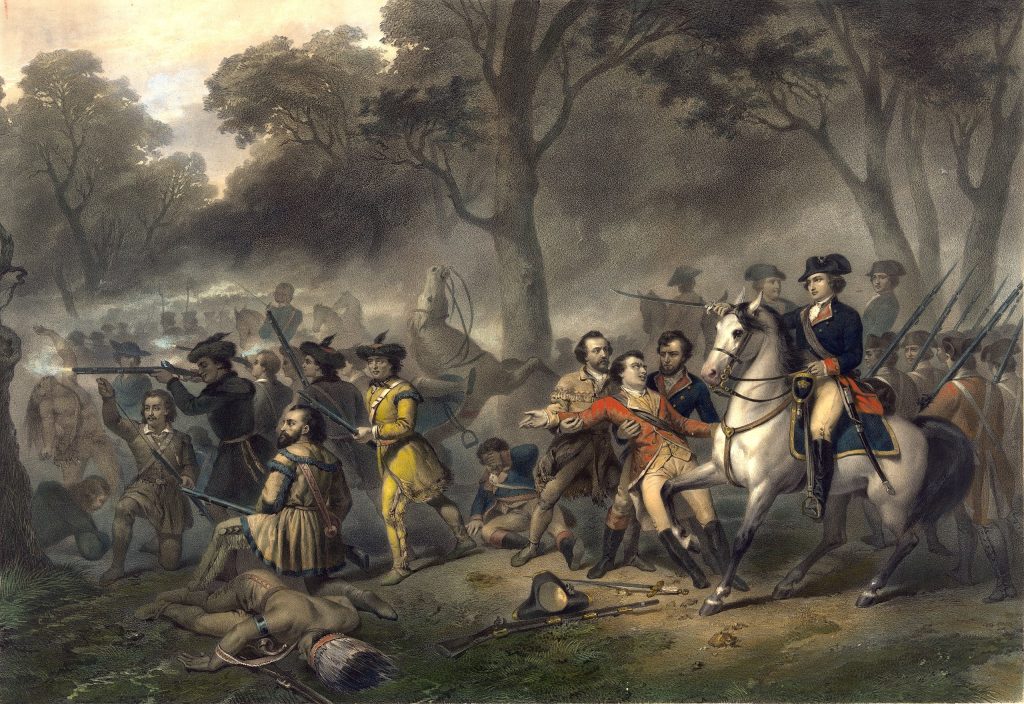 Washington the Soldier is a 1834 portrait of Washington on horseback during the Battle of the Monongahela (Wiki Image).
Washington the Soldier is a 1834 portrait of Washington on horseback during the Battle of the Monongahela (Wiki Image).
George Washington was appointed an adjutant general for the Virginia militia during the French and Indian War. At the age of 20, Governor Robert Dinwiddie commissioned him as a major in the Virginia Regiment. This appointment marked the beginning of Washington’s military career and his involvement in the struggle for control of North America.
The French and Indian War (1754-1763) was a pivotal conflict between the British and French empires to control the Ohio River Valley and the Great Lakes. The war also involved Native American tribes allied with each side. Washington played a significant role in the early stages of the war, serving as an adjutant general and later as a colonel in the Virginia Regiment.
As an adjutant general, Washington was responsible for inspecting and organizing the Virginia militia, a crucial task in preparing for war. He also participated in several scouting missions and engagements with French and Native American forces. His bravery and leadership skills quickly earned him recognition and respect among his peers and superiors.
In 1755, Washington was promoted to colonel and given command of the Virginia Regiment. He led his troops in several battles, including the Battle of Monongahela, where a larger French force defeated him. Despite this setback, Washington’s reputation as a skilled commander continued to grow, and he remained a crucial player in the war effort.
The French and Indian War ended in 1763 with the Treaty of Paris, which granted Britain control of most of North America. Washington’s military experience during the war profoundly impacted his future career and role in the American Revolution. His leadership, courage, and strategic thinking would prove invaluable in the fight for independence.
Washington led the Continental Army to victory in the American Revolutionary War.
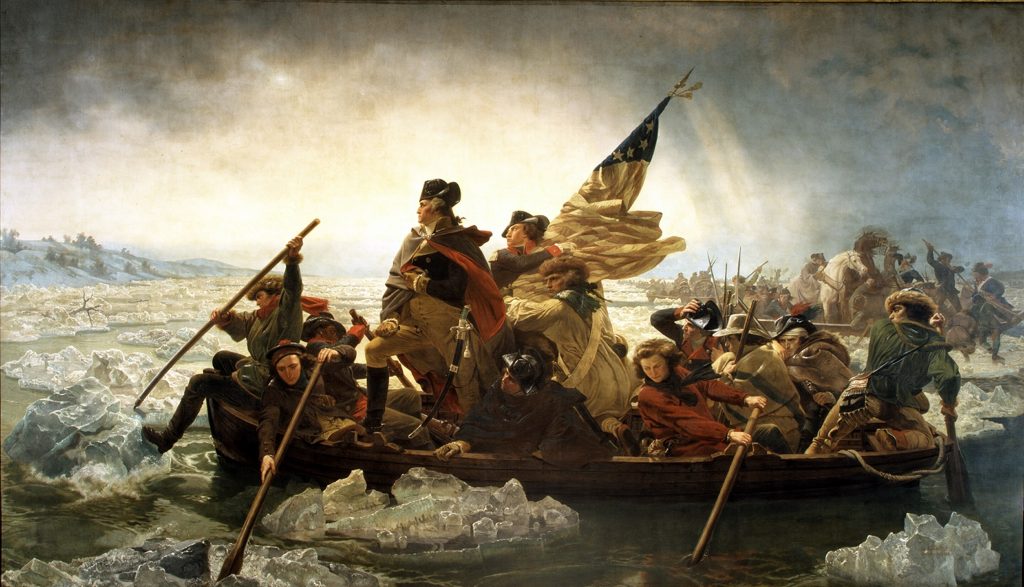 Washington Crossing the Delaware (Wiki Image).
Washington Crossing the Delaware (Wiki Image).
George Washington was pivotal in leading the Continental Army to victory in the American Revolutionary War (1775-1783). As the Commander-in-Chief of the Continental Army, Washington’s strategic leadership, unwavering resolve, and ability to unite the colonies were instrumental in securing American independence from British rule.
Washington’s appointment as Commander-in-Chief in 1775 was critical for the fledgling Continental Army. The untrained and ill-equipped army faced a formidable opponent in the well-disciplined and experienced British forces. Washington’s task was to transform this ragtag army into a cohesive fighting force capable of challenging the British.
Washington’s leadership style was characterized by his calm demeanor, strategic thinking, and ability to inspire his troops. He recognized the importance of discipline and morale and worked tirelessly to instill these qualities in his soldiers. He also recognized the importance of political support and maintained close ties with the Continental Congress and various state governments.
Despite suffering setbacks and defeats throughout the war, Washington never wavered in his belief in the cause of American independence. He rallied his troops after defeats, reorganized his forces, and developed new strategies to counter the British. His resilience and determination were crucial in keeping the Continental Army fighting.
Washington’s military acumen was evident in his strategic decisions, such as the surprise attack on Trenton and the encampment at Valley Forge. These actions demonstrated his ability to outwit and outmaneuver the British, boosting morale and giving hope to the American cause.
The turning point in the war came with the French alliance in 1778. With French support, Washington and his army could corner the British forces at Yorktown in 1781. The decisive victory at Yorktown led to the war’s end and the recognition of American independence.
Washington’s legacy as the Commander-in-Chief of the Continental Army is undeniable. His leadership, strategic thinking, and unwavering commitment to the cause of independence were essential in securing American victory in the Revolutionary War. He is rightly remembered as one of the greatest military leaders in American history.
Washington presided over the Constitutional Convention and played a key role in drafting the United States Constitution and the Bill of Rights.
George Washington was crucial in drafting the United States Constitution and the Bill of Rights. His leadership and influence during the Constitutional Convention and the subsequent ratification process were instrumental in establishing the framework for the American government.
The Constitutional Convention
In 1787, delegates from 13 states gathered in Philadelphia to revise the Articles of Confederation, the flawed governing document of the newly independent United States. Washington, a respected military leader and revered statesman, was unanimously elected as the convention’s presiding officer.
Washington’s presence and leadership at the convention were invaluable. He maintained order and decorum among the delegates, who represented diverse viewpoints and interests. He also played a key role in mediating disputes and forging compromises that ultimately led to the creation of a new constitution.
Washington’s Contributions
Washington’s contributions to the drafting of the Constitution were significant. He advocated for a strong central government capable of addressing the nation’s challenges while ensuring that individual rights and liberties were protected. He supported the creation of a three-branch government with a system of checks and balances, ensuring that no single branch could become too powerful.
Washington also played a crucial role in the ratification process of the Constitution. He campaigned tirelessly for its adoption, emphasizing the need for a stronger national government to secure the nation’s future. His stature and influence helped persuade many states to ratify the Constitution, ultimately leading to its adoption in 1788.
The Bill of Rights
After the Constitution was ratified, the debate over individual rights and liberties continued. Washington, now the United States’ first president, supported adding a Bill of Rights to the Constitution to protect these fundamental rights explicitly.
Washington’s endorsement of the Bill of Rights carried significant weight. He recognized the importance of safeguarding individual freedoms and ensuring the new government would not infringe upon these rights. The Bill of Rights, ratified in 1791, became essential to the Constitution, enshrining protections for freedom of speech, religion, and other fundamental liberties.
Washington’s Legacy
George Washington’s contributions to the drafting and ratifying of the United States Constitution and the Bill of Rights are undeniable. His leadership, wisdom, and unwavering commitment to the principles of democracy were instrumental in shaping the framework for American government. His legacy as a Founding Father endures, and his contributions inspire and guide the nation.
Washington served as the first president of the United States and established many of the institutions and principles that form the foundation of American democracy.
Indeed, George Washington’s presidency played a pivotal role in shaping the course of American democracy. As the first president of the United States, he set precedents, established institutions, and embodied principles that continue to form the bedrock of American governance.
Washington’s presidency spanned two terms, from 1789 to 1797. During this period, he faced the daunting task of establishing a new government and setting precedents for the young republic. His actions and decisions laid the foundation for American democracy and influenced the country’s trajectory for future generations.
Setting Precedents
Washington’s presidency was characterized by his careful consideration of precedents and his desire to establish a standard for future presidents. He established many traditions and customs that still define the office today, including the use of the title “Mr. President” and the delivery of an annual State of the Union address.
Washington also faced crucial decisions about the separation of powers and the balance of power between the federal government and the states. His actions, such as establishing a cabinet and signing the Judiciary Act of 1789, helped define the roles and responsibilities of the three branches of government and the limits of federal power.
Establishing Institutions:
Washington played a central role in establishing essential institutions of American democracy. He appointed the first members of the Supreme Court, including John Jay, as Chief Justice. He oversaw the implementation of the Bill of Rights, the first ten amendments to the Constitution that safeguard individual liberties.
Washington also signed the National Bank Act of 1791, creating the Bank of the United States, which helped stabilize the nation’s financial system and promote economic growth. He recognized the importance of a sound economy and infrastructure, and his actions laid the groundwork for future economic development.
Embodying Principles
Throughout his presidency, Washington embodied the principles of democracy and served as a model for future leaders. He demonstrated respect for the Constitution and the rule of law, upholding the principles of separation of powers and checks and balances.
Washington also exhibited integrity, humility, and a commitment to public service. He avoided seeking excessive power or personal gain and put the nation’s interests above his own. His actions set a high standard for future presidents and reinforced the importance of ethical leadership in a democracy.
Washington’s Legacy
George Washington’s presidency left an enduring legacy on American democracy. His actions and decisions established precedents, created institutions, and embodied principles that continue to shape the American political system. His presidency set the stage for the growth and development of American democracy, and his leadership continues to inspire generations of Americans.
Washington set a precedent for peaceful transitions of power in the United States.
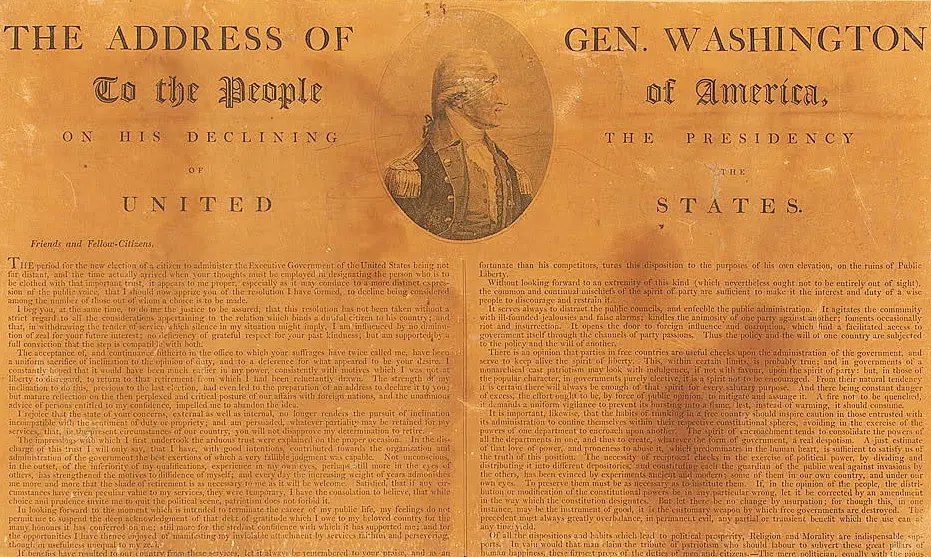 Washington’s Farewell Address was published by the American Daily Advertiser on September 19, 1796 (Wiki Image).
Washington’s Farewell Address was published by the American Daily Advertiser on September 19, 1796 (Wiki Image).
Indeed, George Washington’s decision to step down from the presidency after two terms set a precedent for peaceful transitions of power in the United States. This practice has become a cornerstone of American democracy.
When Washington was elected as the first president of the United States in 1789, there was no established precedent or custom regarding term limits. However, Washington, mindful of the potential dangers of unchecked power and concerned about establishing a republic not reliant on any single individual, voluntarily decided to limit his tenure to two terms.
In 1796, Washington issued his Farewell Address, a remarkable document in which he announced his retirement and imparted valuable advice to the nation. He argued against forming permanent political parties, warned against foreign entanglements, and emphasized the importance of maintaining American neutrality.
Washington’s decision to step down after two terms profoundly impacted the development of American democracy. It helped establish the norm of presidential term limits, preventing any individual from amassing excessive power and ensuring that political power remained accountable to the people.
The peaceful transition of power between Washington and his successor, John Adams, in 1797 further solidified this precedent. It demonstrated that American democracy was not dependent on any single individual but could function effectively through the orderly power transfer between elected officials.
Since Washington’s presidency, every American president has voluntarily adhered to the two-term limit, except for Franklin D. Roosevelt, who was elected to a fourth term during World War II due to national security concerns.
Washington’s decision to step down after two terms is a testament to his commitment to American democracy and his belief in the principles of republican government. His actions helped to establish a tradition of peaceful transitions of power that has become a hallmark of American democracy, ensuring that power remains with the people and not with any single individual.
Washington preserved neutrality in foreign affairs and helped to avoid entanglements in European wars.
Yes, George Washington, the first president of the United States, was committed to maintaining neutrality in foreign affairs and avoiding entanglements in European wars. This policy, outlined in his Farewell Address in 1796, became a cornerstone of American foreign policy for the next century.
Background
The newly independent United States emerged into a world dominated by European powers engaged in frequent wars and power struggles. Having witnessed the devastating effects of war during the American Revolution, Washington was determined to avoid similar conflicts and prevent the United States from becoming embroiled in European affairs.
Neutrality Policy
In his Farewell Address, Washington cautioned against permanent alliances with foreign nations, arguing that such ties could draw the United States into unnecessary conflicts and jeopardize its independence. Instead, he advocated for a “temporary alliances for extraordinary occasions” policy, emphasizing that the United States should maintain its freedom to act in its best interests.
Washington’s neutrality policy was not one of isolationism. He recognized the importance of trade and diplomatic relations with other nations but believed these ties should not compromise American sovereignty or security. He pursued commercial treaties with various countries, including Great Britain and France, while maintaining a careful balance between the competing interests of these European powers.
Impact of Neutrality Policy
Washington’s neutrality policy significantly impacted the United States’ early years. It helped to preserve the country’s scarce resources and avoid costly wars, allowing it to focus on domestic development and economic growth. It also enabled the United States to establish its identity as an independent nation, distinct from the European powers.
Legacy
Washington’s neutrality policy, though challenged at times, remained largely in place for over a century. It provided a framework for American foreign policy, guiding the nation through global turmoil and helping shape its unique role.
Washington’s commitment to neutrality reflected his belief in the importance of American self-reliance and his desire to safeguard the country’s independence. His legacy continues to influence American foreign policy, reminding the nation of the importance of maintaining a balance between engagement with the world and protecting its own interests and security.
Washington promoted economic development and trade.
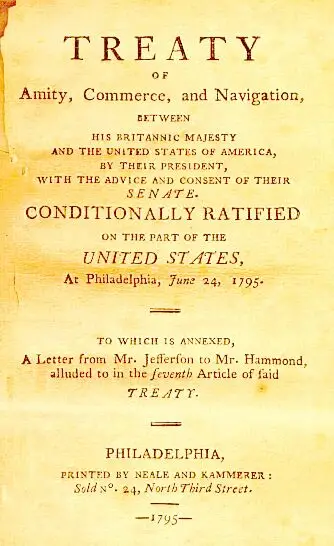
Cover of a 1795 pamphlet containing the text of the Jay Treaty (Wiki Image).
George Washington, the United States’ first president, recognized the importance of economic development and trade in building a strong and prosperous nation. During his presidency, he implemented various policies and initiatives aimed at fostering economic growth, expanding trade, and promoting financial stability.
Promoting Economic Development
Washington believed that a strong economy was essential for the success of the newly formed republic. He encouraged domestic manufacturing, supported infrastructure development, and promoted agriculture as the cornerstone of the American economy.
- Manufacturing: Washington supported the establishment of industries and manufacturing enterprises, believing that domestic production would reduce reliance on foreign imports and stimulate economic growth.
- Infrastructure: Washington recognized the importance of a well-developed infrastructure for facilitating trade and commerce. He supported the construction of roads, bridges, and canals, which improved transportation networks and enabled the efficient movement of goods and people.
- Agriculture: Washington, himself a farmer, understood the significance of agriculture to the American economy. He promoted agricultural practices, encouraged land settlement, and supported measures to improve farming techniques and productivity.
Expanding Trade
Washington believed expanding trade with other nations would open up new markets for American goods, foster economic growth, and enhance the nation’s global standing. He pursued commercial treaties with various countries, including Great Britain and France, establishing favorable terms for trade and commerce.
- Commercial Treaties: Washington negotiated commercial treaties with several European powers, aiming to secure preferential tariffs, reduce trade barriers, and expand access to foreign markets for American products.
- Trading Partnerships: Washington encouraged the development of trading partnerships with other nations, recognizing the mutual benefits of exchanging goods and services. He promoted the idea of free trade and fair competition, believing that open markets would stimulate economic growth and prosperity.
Promoting Financial Stability:
Washington understood the importance of a stable financial system for a healthy economy. He supported the establishment of a national bank, the Bank of the United States, which provided a central institution for managing the nation’s currency, regulating banking practices, and facilitating financial transactions.
- National Bank: The Bank of the United States, established under Washington’s presidency, played a crucial role in stabilizing the nation’s currency, providing credit to businesses, and regulating the financial system.
- Fiscal Responsibility: Washington advocated for fiscal responsibility, emphasizing the need for a balanced budget and prudent management of government finances. He believed sound fiscal policies were essential for maintaining economic stability and avoiding excessive debt.
Washington’s Economic Legacy
George Washington’s policies and initiatives aimed at promoting economic development, expanding trade, and fostering financial stability laid the foundation for a growing and prosperous American economy. His legacy as a proponent of economic expansion and responsible fiscal management continues to influence American economic policy, highlighting the importance of a strong economy for the nation’s well-being and global standing.
Washington oversaw the United States’ expansion and the settlement of the Northwest Territory.
Indeed, George Washington, the first president of the United States, played a significant role in overseeing the nation’s expansion and the settlement of the Northwest Territory. During his presidency, he implemented policies and initiatives that facilitated westward expansion, promoted land settlement, and established a framework for governing the newly acquired territories.
Background
After the American Revolution, the newly formed United States held vast, unexplored territories west of the Appalachian Mountains. The Northwest Territory, encompassing present-day Ohio, Indiana, Illinois, Michigan, Wisconsin, and parts of Minnesota, was particularly important for expansion due to its fertile lands and strategic location.
Northwest Territory Ordinance
One of Washington’s most significant contributions to westward expansion was the Northwest Territory Ordinance of 1787. This landmark legislation established a framework for governing the Northwest Territory, promoting orderly settlement, and safeguarding Native American rights.
- Structured Settlement: The ordinance outlined a structured process for dividing the territory into smaller units, surveying land, and selling it to settlers. This orderly approach aimed to prevent land speculation and promote stable settlement patterns.
- Slavery Prohibition: The ordinance prohibited slavery in the Northwest Territory, a groundbreaking decision that reflected Washington’s personal abhorrence of slavery and his belief in promoting equal rights for all citizens.
- Native American Rights: The ordinance recognized the rights of Native American tribes inhabiting the territory, requiring that land acquisitions be negotiated through fair treaties and that tribes retain their sovereignty over their lands.
Impact of the Ordinance:
The Northwest Territory Ordinance profoundly impacted westward expansion and the development of American democracy. It provided a framework for governing newly acquired territories, promoting orderly settlement, and safeguarding Native American rights. The ordinance’s prohibition of slavery in the Northwest Territory set a precedent for the gradual abolition of slavery in the United States.
Washington’s Support for Expansion
Beyond the Northwest Territory Ordinance, Washington actively supported westward expansion through various policies and initiatives. He dispatched surveyors to explore the western territories, encouraged land sales to settlers, and supported the construction of roads and forts to facilitate settlement and protect travelers.
- Surveying Expeditions: Washington commissioned surveying expeditions to map the western territories, providing settlers with essential information about land availability and resources.
- Land Sales: Washington oversaw the establishment of land offices to sell land to settlers, generating revenue for the government and encouraging westward migration.
- Infrastructure Development: Washington supported the construction of roads, bridges, and forts in the western territories, improving transportation networks and providing security for settlers.
Legacy of Westward Expansion
George Washington’s contributions to westward expansion played a crucial role in shaping the American nation’s territorial growth and demographic development. His support for exploration, settlement, and infrastructure laid the foundation for the westward movement that would define much of American history.
Washington’s vision for westward expansion was not without its challenges and complexities. The displacement of Native American tribes and the environmental impact of settlement raise important questions about the ethical and ecological consequences of the expansion process. Nevertheless, Washington’s role in promoting westward expansion and establishing a framework for governing newly acquired territories is significant in American history.
Vladimir Lenin (Communist)
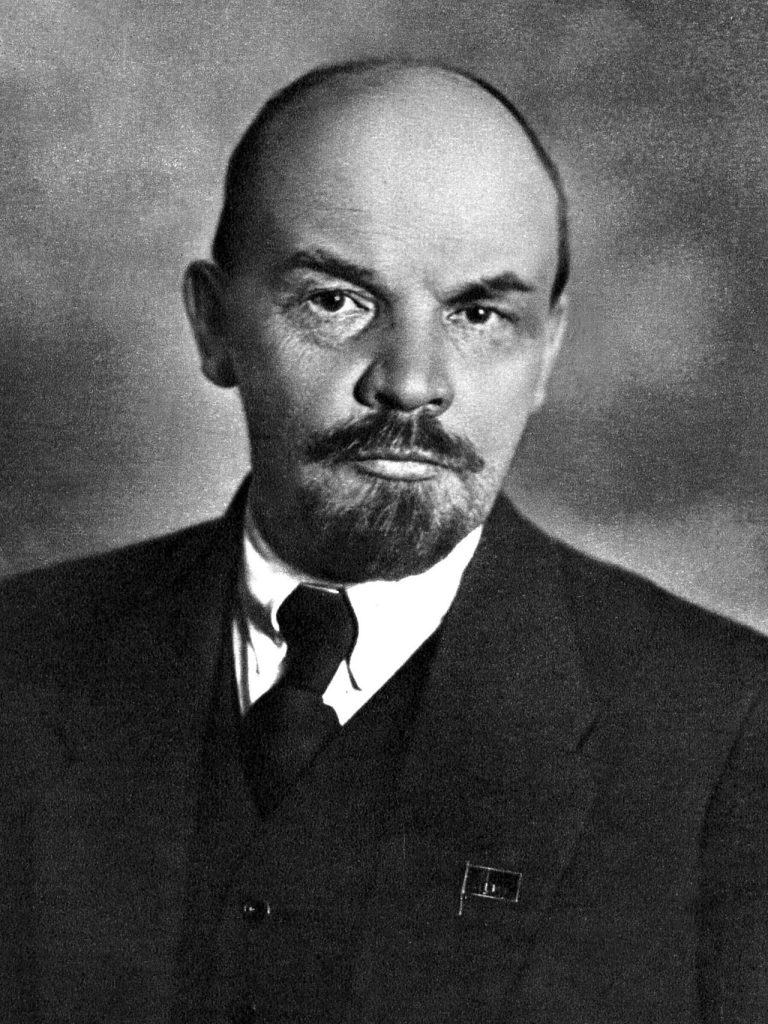
Lenin in 1920
(Wiki Image By Unknown, presumably official – [1], date attested from http://www.marxists.org/archive/lenin/photo/1920/015.htm, Public Domain, https://commons.wikimedia.org/w/index.php?curid=136632614)
Vladimir Lenin Quotes
Here are some of the most famous and influential quotes attributed to Vladimir Lenin, categorized by theme.
On Revolution
“A revolution is impossible without a revolutionary situation; furthermore, not every revolutionary situation leads to revolution.”
“There are decades where nothing happens; and there are weeks where decades happen.” — This quote perfectly captures the explosive pace of events during 1917.
“The oppressed are allowed once every few years to decide which particular representatives of the oppressing class are to represent and repress them in parliament.” — A cynical critique of bourgeois democracy.
On Political Power and Strategy
“The art of any propagandist and agitator consists in his ability to find the best means of influencing any given audience, by presenting a given idea to them in the most easily digestible form.”
“A lie told often enough becomes the truth.”
“Our program necessarily includes the propaganda of atheism.”
On the State and Dictatorship
“The state is a machine for maintaining the rule of one class over another.”
“The dictatorship of the proletariat is a persistent struggle—bloody and bloodless, violent and peaceful, military and economic, educational and administrative—against the forces and traditions of the old society.”
On Communism and Learning
“No amount of political freedom will satisfy the hungry masses.”
“One man with a gun can control one hundred without one.”
“Learn, learn, and learn again.” — Emphasizing the need for communists to constantly educate themselves.
Vladimir Lenin YouTube Video Links Views
Here are some of the most popular and informative YouTube videos about Vladimir Lenin, including documentaries, biographies, and insights into the Russian Revolution.
1. History vs. Vladimir Lenin – Alex Gendler
- Views: 6,115,742
- Link: http://www.youtube.com/watch?v=9N8hsXQapjY
- Description: This highly engaging TED-Ed animated video provides a concise yet comprehensive overview of Lenin’s life and legacy, exploring the complex historical debate surrounding his actions.
2. The Russian Revolution (1917)
- Views: 3,821,416
- Link: http://www.youtube.com/watch?v=KOK1TMSyKcM
- Description: A clear and concise animated explanation from “Simple History” detailing the events of the Russian Revolution, with Lenin as a central figure.
3. Vladimir Lenin, Russian revolutionary, documentary footage (HD1080).
- Views: 3,214,559
- Link: http://www.youtube.com/watch?v=WsmMFWaVqoA
- Description: This video offers a valuable compilation of historical documentary footage of Lenin, providing a direct visual connection to the revolutionary leader.
4. Ten Minute History – The Russian Revolution (Short Documentary)
- Views: 3,009,941
- Link: http://www.youtube.com/watch?v=ZZ55ZvBe07U
- Description: A brief yet informative summary of the Russian Revolution by “History Matters,” making complex events accessible.
5. Russian Revolution and Civil War: Crash Course European History #35
- Views: 1,778,855
- Link: http://www.youtube.com/watch?v=U6KR4cLLVzQ
- Description: Part of the popular Crash Course series, this video provides a fast-paced and insightful look into the Russian Revolution and subsequent Civil War, highlighting Lenin’s role.
6. The Hall of Evil: Vladimir Lenin | 5-Minute Videos | PragerU
- Views: 1,137,290
- Link: http://www.youtube.com/watch?v=PHzCQT5Vqks
- Description: A critical perspective on Lenin’s legacy from PragerU, focusing on his role in establishing a totalitarian regime.
Vladimir Lenin Books
For a single, definitive book on Vladimir Lenin, the best modern choice is “Lenin: The Man, the Dictator, and the Master of Terror” by Victor Sebestyen.
As one of the 20th century’s most consequential figures, the literature on Lenin is vast. Here are some of the most essential books, broken down by what a reader might be looking for.
The Definitive Modern Biography 🇷🇺
“Lenin: The Man, the Dictator, and the Master of Terror” by Victor Sebestyen
Published in 2017, this is a highly readable and comprehensive biography that draws on new archival material from the post-Soviet era. Sebestyen provides a gripping narrative that focuses not just on Lenin’s political theories but on the man himself—his personal relationships, his iron will, and his role in pioneering the modern totalitarian state through the use of terror.
Written by Lenin Himself 📖
To understand Lenin’s ideology, it is crucial to read his own words. His most important and influential works are:
- “What Is to Be Done?” (1902): The foundational text of Leninism. Here, he argues that the working class needs a small, disciplined “vanguard party” of professional revolutionaries to lead it, as it will not achieve revolutionary consciousness on its own.
- “Imperialism, the Highest Stage of Capitalism” (1916): Lenin’s major analysis of global politics, in which he argued that World War I was an inevitable conflict between capitalist powers fighting over colonies and resources.
- “The State and Revolution” (1917): Written on the eve of the October Revolution, this is his blueprint for seizing power, destroying the existing state, and establishing a “dictatorship of the proletariat.”
The Classic Critical History
“The Russian Revolution” by Richard Pipes
This is a monumental and powerfully argued history of the entire revolutionary period, with Lenin as the central and, in Pipes’s view, destructive protagonist. It is a classic of 20th-century historical writing, renowned for its meticulous research and staunchly anti-communist perspective. It is an essential work for understanding the full context and consequences of Lenin’s actions.
For a Broader Social History
“A People’s Tragedy: The Russian Revolution, 1891-1924” by Orlando Figes
This Pulitzer Prize-winning book tells the story of the revolution from the bottom up, through the eyes of ordinary people, peasants, and soldiers. While Lenin is a key figure, the book provides a vast and moving social history that explains why the Russian Empire collapsed and how the Bolsheviks were able to seize power in the ensuing chaos.
Vladimir Lenin History
Here’s a clear overview of Vladimir Lenin’s history:
Early Life (1870–1895)
- Born April 22, 1870, in Simbirsk, Russia (later renamed Ulyanovsk in his honor).
- The family was well-educated; his father was a school inspector.
- After his older brother was executed in 1887 for plotting to assassinate Tsar Alexander III, Lenin became radicalized and turned against the monarchy.
- Studied law at Kazan and later at St. Petersburg University, becoming involved in revolutionary Marxist circles.
Revolutionary Career (1895–1917)
- Arrested in 1895 for revolutionary activities and exiled to Siberia for three years.
- Founded the Russian Social Democratic Labour Party (RSDLP) with other Marxists.
- Split the party into Bolsheviks (Lenin’s faction, favoring a disciplined revolutionary vanguard) and Mensheviks (favoring broader participation).
- Lived much of his early career in exile (Switzerland, Germany, and elsewhere), writing influential works like What Is to Be Done? (1902).
- Returned to Russia during the February Revolution (1917) after Tsar Nicholas II abdicated, famously transported in a “sealed train” by Germany.
October Revolution & Leadership (1917–1921)
- Led the Bolshevik seizure of power in October 1917 (the October Revolution).
- Established the world’s first Marxist socialist state, reorganizing Russia as the Soviet Republic.
- Signed the Treaty of Brest-Litovsk (1918), pulling Russia out of World War I at the cost of vast territories.
- Faced the Russian Civil War (1918–1921), with the Red Army fighting the White Army and foreign interventions.
- Created the Cheka (secret police) and introduced the Red Terror to suppress opposition.
Later Years & Death (1921–1924)
- Following the victory in the civil war, the Soviet Union introduced the New Economic Policy (NEP) in 1921, which allowed for limited private trade to revive the devastated economy.
- Health declined after a series of strokes (starting in 1922).
- Died January 21, 1924, in Gorki, near Moscow.
- His body was embalmed and placed in the Lenin Mausoleum in Moscow’s Red Square.
Legacy
- Lenin remains one of the most influential political figures of the 20th century.
- His ideas shaped global communist movements, and the Soviet Union he founded lasted until 1991.
- He is remembered both as a visionary revolutionary and as a figure whose methods (dictatorship, suppression of dissent) set precedents for authoritarian rule in the USSR.
👉 Do you want me also to make a timeline table of Lenin’s major life events (like I did for Caesar and Charlemagne earlier), so it’s easy to see his progression at a glance?
Lenin (1870–1916)

Lenin (seated centre) with other members of the League of Struggle for the Emancipation of the Working Class, 1897
(Wiki Image By Nadezhda Konstantinovna Krupskaya (1869-1939) – http://www.marxists.org/archive/lenin/photo/1895-1917/1897-1.htm, Public Domain, https://commons.wikimedia.org/w/index.php?curid=1548894)
The period from his birth in 1870 to 1916 covers Vladimir Lenin’s complete transformation from a student into a hardened professional revolutionary, defined by radicalization, exile, and the meticulous construction of the Bolshevik Party from abroad.
Formative Years and Radicalization (1870-1894)
Born Vladimir Ilyich Ulyanov, Lenin grew up in a comfortable, educated middle-class family. His life was irrevocably changed in 1887 when his older brother, Aleksandr, was executed for his role in a plot to assassinate Tsar Alexander III. This event profoundly radicalized the 17-year-old Lenin, who was soon expelled from university for participating in protests that he had organized himself. He dedicated himself to studying the works of Karl Marx and became a committed revolutionary. By the end of this period, he was an active Marxist organizer in St. Petersburg.
Professional Revolutionary: Arrest and Exile (1895-1914)
This phase began with Lenin’s arrest in 1895, followed by a three-year exile in Siberia. It was there he married fellow revolutionary Nadezhda Krupskaya and continued his theoretical writing, adopting the famous pseudonym “Lenin” around 1901.
After his exile, he spent over a decade in Western Europe (Munich, London, Geneva), relentlessly working to build a political party. His key achievements during this time were:
- Publishing “What Is to Be Done?” (1902): This pamphlet laid out his core belief in a small, disciplined “vanguard party” of professional revolutionaries to lead the working class.
- Creating the Bolsheviks (1903): At a party congress in London, he engineered a split between his hard-line faction, the Bolsheviks (from bolshinstvo, meaning “majority”), and the more moderate Mensheviks.
World War I and “Revolutionary Defeatism” (1914-1916)
When World War I broke out, most European socialists abandoned internationalism to support their own nations. From his exile in neutral Switzerland, Lenin took a radical and unpopular stance. He condemned the conflict as an “imperialist war” fought for profit and colonies. He promoted a policy of “revolutionary defeatism,” urging the working class across Europe to turn their guns not on each other, but on their own governments, and transform the “imperialist war into a civil war.”
By the end of 1916, Lenin was a relatively obscure yet fiercely determined figure living in exile in Zurich. His anti-war stance had isolated him from many socialists. Still, the immense strain of the war on the Russian Empire was creating the exact revolutionary conditions he had been preparing for his entire adult life.
Lenin (1917)
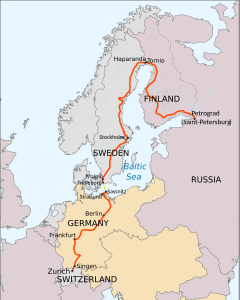
Lenin’s travel route from Zurich to Saint Petersburg in April 1917, including the ride in a sealed train through German territory
(Wiki Image By Kimdime – Own work based on File:Blank map of Europe 1914.svg, CC BY-SA 4.0, https://commons.wikimedia.org/w/index.php?curid=116116243)
The year 1917 was the most pivotal year of Vladimir Lenin’s life, during which he transformed from an obscure and seemingly irrelevant exile into the leader of Russia.
January – March: Frustrated Exile
At the start of the year, Lenin was living in Zurich, Switzerland, deeply pessimistic about the prospects for revolution. In January, he famously told a group of young socialists, “We of the older generation may not live to see the decisive battles of this coming revolution.” He was completely taken aback when, just weeks later, the February Revolution unexpectedly erupted in Russia, forcing Tsar Nicholas II to abdicate and establishing a moderate Provisional Government.
April: The “Sealed Train” and the April Theses
Lenin immediately saw his opportunity. His main obstacle was getting back to Russia. In a fateful decision, the German government—believing he would destabilize their Russian enemy and pull them out of World War I—arranged for Lenin and other revolutionaries to travel across Germany in a diplomatically sealed train.
He arrived at Finland Station in Petrograd on April 3rd and immediately shocked the political establishment. Instead of supporting the new government, he delivered his famous “April Theses,” a radical program calling for:
- No support for the Provisional Government.
- The transfer of “All power to the Soviets” (the workers’ councils).
- An immediate end to the war.
He adopted the simple, powerful slogan that resonated with the masses: “Peace, Land, and Bread.”
July – August: Setback and Recovery
In July, a premature pro-Bolshevik uprising known as the “July Days” failed. The government cracked down, accused Lenin of being a German spy, and forced him to flee to Finland in disguise. It seemed the Bolsheviks had lost their chance.
However, in August, the Russian General Kornilov attempted a right-wing military coup. The panicked Provisional Government armed the Bolshevik Red Guards to defend the city. The coup failed, but the Bolsheviks emerged as the saviors of the revolution, and their popularity surged.
October: The Revolution
From hiding, Lenin relentlessly pushed the Bolshevik Central Committee to seize power. On the night of October 24-25 (November 6-7 on the modern calendar), the Bolsheviks, brilliantly organized by Leon Trotsky, executed a swift and largely bloodless coup. They seized control of key infrastructure in Petrograd and stormed the Winter Palace, arresting the members of the Provisional Government.
November – December: Consolidating Power
Lenin emerged from hiding as the new leader of Russia. His first acts were to issue the Decree on Peace (calling for an end to the war) and the Decree on Land (abolishing private ownership). By the end of the year, he had formed a new government and established the Cheka, the secret police, to begin crushing all opposition and laying the foundation for the world’s first communist state.
Lenin (1918)
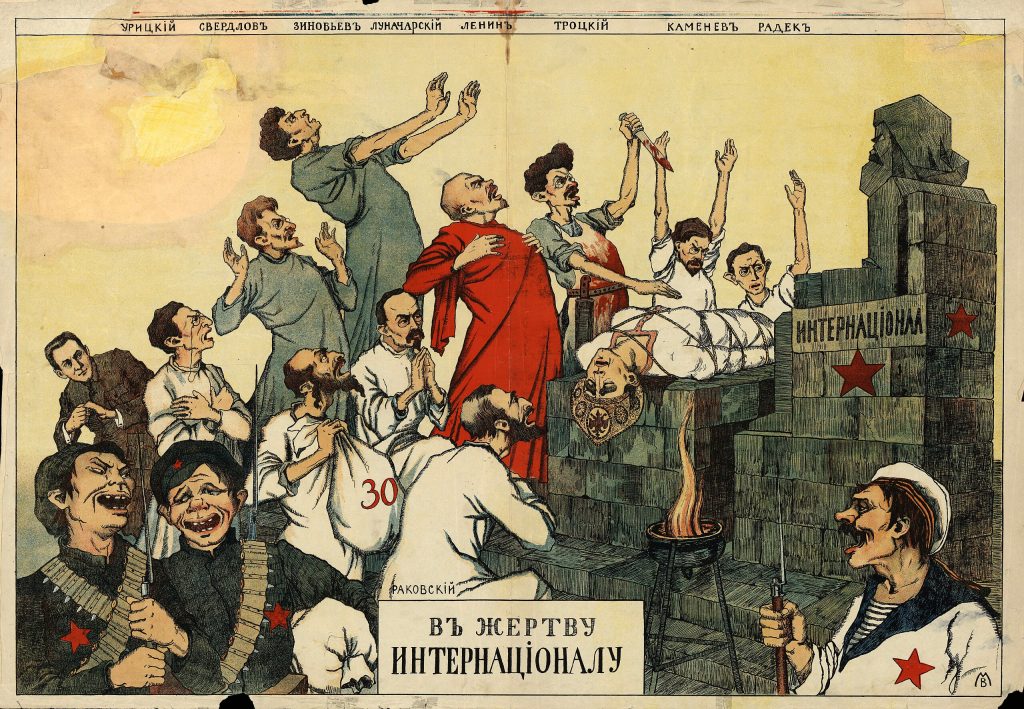
White anti-Bolshevik propaganda poster, depicting Lenin aiding Bolsheviks in sacrificing Russia to a statue of Marx, c. 1918–1919
(Wiki Image By Неизвестный художник (не указан в выходных данных плаката; имеется нерасшифрованная авторская монограмма «МВ» или «ВМ») – Российская государственная библиотекаReproduced in various historical studies of revolutionary Russia, and on various websites, including that of the Victoria and Albert Museum, which has a copy of the poster in its collection., Public Domain, https://commons.wikimedia.org/w/index.php?curid=25008598)
For Vladimir Lenin, 1918 was a year of brutal consolidation, defined by a humiliating peace treaty, the formal creation of a one-party dictatorship, and the violent descent into a full-scale civil war.
Having seized power in late 1917, Lenin’s primary goal in 1918 was to hold onto it at any cost against enemies from both outside and within Russia.
Dissolving Democracy (January)
The year began with the only meeting of the freely elected Constituent Assembly. The Bolsheviks had won less than 25% of the vote, with the Socialist Revolutionary Party winning a clear majority. Recognizing that he had lost the democratic mandate, Lenin allowed the assembly to meet for a single day on January 18, 1918, before his Red Guards forcibly dissolved it. This act effectively ended any prospect of a multi-party democracy and signaled the Bolsheviks’ intention to rule as a dictatorship.
The Humiliating Peace: Treaty of Brest-Litovsk (March)
To fulfill his promise of “Peace,” Lenin sought to pull Russia out of World War I. The German terms were catastrophic, demanding that Russia give up vast, valuable territories including Ukraine, Finland, and the Baltic states. Many Bolsheviks were horrified and argued for a “revolutionary war.”
Lenin, however, was a pragmatist. He argued that the survival of the revolution in Russia was paramount and that sacrificing territory was necessary to gain the “breathing space” needed to fight internal enemies. He forced the treaty through, and on March 3, 1918, Russia signed the humiliating Treaty of Brest-Litovsk, ending its involvement in the war.
Civil War and the Red Terror (Mid- to Late 1918)
With the external war over, the internal one began. Anti-Bolshevik forces (the “Whites”), backed by foreign powers, began to organize. In July, to prevent the rescue of the former Tsar by advancing White forces, local Bolsheviks executed Tsar Nicholas II and his entire family.
On August 30, 1918, Lenin himself was shot and severely wounded in an assassination attempt by a Socialist Revolutionary member. In response, the regime officially unleashed the “Red Terror.” Led by the Cheka (the secret police), this was a systematic campaign of mass arrests, torture, and executions targeting not just active opponents, but entire classes of people, such as the bourgeoisie, aristocrats, and priests.
By the end of 1918, Lenin’s regime had survived, but at a terrible cost. The country was engulfed in a savage civil war, the economy was collapsing under the policy of “War Communism,” and the Red Terror had established the new state’s reliance on systematic violence to maintain power.
Lenin (1919)

Lenin was in one of the committees of the II Congress of the Comintern
(Wiki Image By Unknown author – The second Congress of the Comintern. Edited by O. Piatnitsky et al. Moscow, Party publishing house, 1934., Public Domain, https://commons.wikimedia.org/w/index.php?curid=53694382)
For Vladimir Lenin, 1919 was the year of maximum peril and the decisive turning point of the Russian Civil War. It was a period when his Bolshevik regime came closest to annihilation but ultimately survived through ruthless policies and military resolve.
The entire year was consumed by the existential struggle against the anti-Bolshevik “White” armies, which were attacking from multiple fronts with support from foreign powers.
The Civil War at its Peak
1919 was the high-water mark for the White armies. Lenin’s regime was surrounded and on the verge of collapse:
- General Anton Denikin’s forces advanced from the south, capturing key cities and threatening the new capital, Moscow.
- Admiral Alexander Kolchak’s army launched an attack from Siberia in the east.
- General Nikolai Yudenich launched an offensive from the northwest, coming within sight of Petrograd.
From his headquarters in the Kremlin, Lenin directed the political and economic war effort, working closely with Leon Trotsky, who brilliantly organized the Red Army. An iron will and the demand for absolute discipline and sacrifice defined Lenin’s leadership.
Intensification of “War Communism”
To feed and supply the Red Army, Lenin intensified the brutal economic policy of “War Communism.” In 1919, this reached its most extreme form:
- Forced Grain Requisitioning: Armed detachments were dispatched into the countryside to seize grain from peasants, resulting in widespread starvation and peasant revolts.
- Nationalization of All Industry: The state took control of virtually every factory and workshop.
- Militarization of Labor: Workers were subjected to military-style discipline to ensure production for the war effort.
Lenin viewed these measures as harsh necessities, essential for the survival of the revolution, even if it meant sacrificing lives.
Founding the Communist International (Comintern)
Despite being surrounded, Lenin remained focused on his goal of a global revolution. In March 1919, he founded the Communist International (Comintern) in Moscow. This organization was established to unite and direct communist parties worldwide, to overthrow capitalism globally. The Comintern was Lenin’s tool to export the revolution, reflecting his belief that the survival of Soviet Russia ultimately depended on a worldwide socialist uprising.
By the close of 1919, the tide of the war had miraculously turned. The Red Army had defeated Kolchak and repelled the other major White offensives. Lenin’s government, though presiding over a devastated and starving country, had broken the back of its enemies and secured the survival of the world’s first communist state.
Lenin (1920)
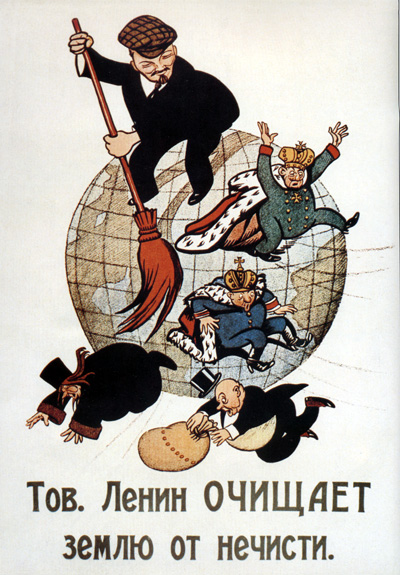
Bolshevik propaganda poster from 1920, featuring a political cartoon that depicts Lenin sweeping away monarchs, clergy, and capitalists. The caption reads “Comrade Lenin Cleanses the Earth of Filth”.
(Wiki Image By Viktor Deni – Originally uploaded to en.wikipedia.org, Public Domain, https://commons.wikimedia.org/w/index.php?curid=1977294)
For Vladimir Lenin, 1920 was a year of contradictions. His regime achieved the final, decisive victories in the Russian Civil War, but his dream of exporting the revolution was crushed in a disastrous war with Poland. All the while, his economic policy of “War Communism” was pushing the nation toward total internal collapse.
Ending the Civil War and the War with Poland
By the start of 1920, the major White armies had been shattered. The year was spent “mopping up” the last remnants of organized resistance. The final large-scale threat, an army led by General Pyotr Wrangel in Crimea, was defeated by the Red Army in November 1920, effectively bringing the conventional phase of the Russian Civil War to a close.
However, a new external conflict erupted. Poland, newly independent and seeking to expand its borders, launched an invasion of Ukraine in April 1920. The Red Army mounted a powerful counter-offensive that drove the Polish forces back to the outskirts of Warsaw. Lenin and the Bolsheviks became overconfident, believing they could march through Poland and ignite a communist revolution in Germany.
This dream was shattered in August 1920 at the Battle of Warsaw, often referred to as the “Miracle on the Vistula.” The Polish army, in a stunning victory, decisively defeated the advancing Red Army. This defeat was a major ideological and military blow for Lenin, forcing him to abandon his hopes for an immediate European revolution and to recognize the powerful force of nationalism.
The Crisis of War Communism
While the Red Army was victorious at home, the country was in a state of ruin. Three years of War Communism—the policy of seizing grain and nationalizing all industry—had led to a catastrophic breakdown of the economy.
- Industrial Collapse: Industrial production had fallen to a fraction of its pre-war levels.
- Mass Starvation: The forced requisitioning of grain from peasants led to widespread famine and massive, violent peasant uprisings, such as the Tambov Rebellion, which grew throughout 1920.
- Urban Exodus: Cities were depopulating as starving workers fled to the countryside in search of food and sustenance.
By the end of 1920, Lenin was the undisputed master of Russia. However, he was ruling over a devastated and starving nation on the brink of a new internal explosion. The victory in the Civil War was clear, but so was the catastrophic failure of his economic policies, setting the stage for his dramatic ideological retreat in the year that followed.
Lenin (1921)
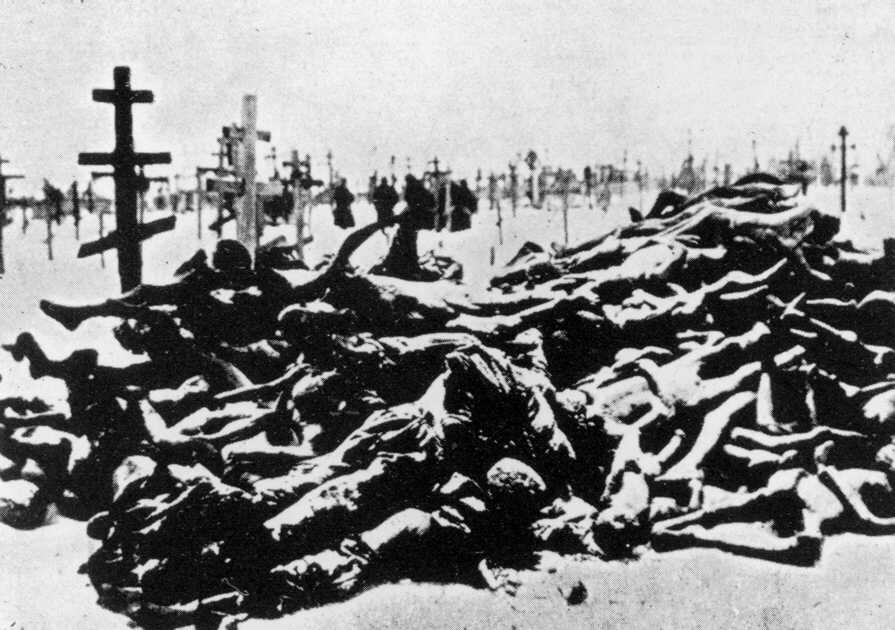
Victims of the famine in Buzuluk, Orenburg Oblast, winter 1921/1922
(Wiki Image By Dr Fridtjof Nansen (1861 – 1930) – ArtUkraine.com, Public Domain, https://commons.wikimedia.org/w/index.php?curid=4285941)
For Vladimir Lenin, 1921 was the year he faced a rebellion from his own staunchest supporters and was forced to make a dramatic ideological retreat to save his regime, abandoning the disastrous policy of War Communism in favor of the New Economic Policy (NEP).
The year began with the Bolshevik state on the brink of total collapse after the brutal Civil War.
The Kronstadt Rebellion: “The Flash Which Lit Up Reality”
By early 1921, the country was devastated by famine, and the economy was in ruins. Peasant uprisings raged across the nation. The breaking point came in March 1921 with the Kronstadt Rebellion.
The sailors at the Kronstadt naval base had been the most heroic and celebrated supporters of the Bolsheviks in 1917, hailed as the “pride and glory of the Revolution.” Now, they rose up in open revolt, demanding an end to the Bolsheviks’ one-party dictatorship, freedom of speech, and, most importantly, an end to the forced seizure of grain from peasants. Their slogan was “Soviets without Bolsheviks.”
The rebellion terrified Lenin. He called it “the flash which lit up reality better than anything else.” It was a clear sign that the Bolsheviks had lost the support of their core working-class constituency. Lenin ordered the rebellion to be crushed with merciless brutality, and the Red Army, under Trotsky’s command, stormed the fortress across the ice, killing and executing thousands of the revolutionary sailors.
The New Economic Policy (NEP): A “Strategic Retreat”
Shaken by the Kronstadt rebellion, Lenin knew he had to change course or his regime would be overthrown. At the 10th Party Congress, which was taking place during the rebellion, Lenin announced a significant policy reversal: the New Economic Policy (NEP).
He himself referred to it as a “strategic retreat.” The NEP:
- Ended forced grain requisitioning, replacing it with a fixed tax. Peasants could sell their surplus grain on the open market for a profit.
- Legalized private trade and small private businesses.
- Allowed for a return to a cash economy.
While the state kept control of major industries (the “commanding heights”), the NEP was effectively a return to a limited market economy. Many hardline Bolsheviks were horrified, viewing it as a betrayal of communism and a restoration of capitalism. Lenin used his immense authority to push the policy through, arguing it was a temporary but necessary step to rebuild the devastated country and, crucially, to restore the broken alliance between the workers and the peasantry.
By the end of 1921, Lenin had pulled his state back from the abyss. The NEP initiated the slow process of economic recovery. Still, it did so by compromising on core communist principles, a move that would define the Soviet economy for the next seven years.
Lenin (1922-1924)

Lenin in a wheelchair shortly after his third stroke in March 1923
(Wiki Image By Maria Ulyanova – The State Museum of Russian Political History, Public Domain, https://commons.wikimedia.org/w/index.php?curid=5789463)
The period from 1922 to his death in 1924 was defined by Vladimir Lenin’s catastrophic decline in health, his desperate attempts to shape the future of the Soviet Union from his sickbed, and the beginning of the ruthless power struggle between his potential successors, most notably Joseph Stalin and Leon Trotsky.
A Series of Devastating Strokes
Lenin’s health, already poor, collapsed during this period.
- First Stroke (May 1922): Left him partially paralyzed and severely impaired his ability to speak. He recovered enough to return to work part-time by late 1922.
- Second Stroke (December 1922): This was far more severe and effectively ended his political career, forcing him into permanent retirement at his dacha in Gorki.
- Third Stroke (March 1923): This was the final, devastating blow. It left him unable to speak and almost completely paralyzed. He remained in this state, a complete invalid, for the rest of his life.
During this decline, on December 30, 1922, the Union of Soviet Socialist Republics (USSR) was formally established, marking the official creation of the state he had founded.
Lenin’s “Last Testament”
In the brief period of clarity between his second and third strokes (December 1922 – January 1923), a deeply worried Lenin dictated a series of notes that became known as his “Last Testament.” He was alarmed by the growing bureaucracy of the party and the personalities of its leaders.
The most crucial part of this document was his assessment of Joseph Stalin, who had recently been appointed General Secretary of the Party. Lenin wrote:
“Comrade Stalin, having become General Secretary, has unlimited authority concentrated in his hands, and I am not sure whether he will always be capable of using that authority with sufficient caution.”
He later added a postscript explicitly recommending that the comrades “find a way to remove Stalin from that post.” He also gave critical assessments of other leaders, including Trotsky, whom he called the “most capable” but also noted his “excessive self-assurance.”
The Power Struggle and Death
As Lenin became incapacitated, the fight to succeed him began in earnest. A “triumvirate” of Grigory Zinoviev, Lev Kamenev, and Joseph Stalin allied to isolate their main rival, Leon Trotsky, politically. As General Secretary, Stalin controlled all party appointments and was able to place his loyalists in key positions, quietly consolidating immense power.
Vladimir Lenin finally died on January 21, 1924, at the age of 53.
After his death, his widow presented the “Last Testament” to the Central Committee. Stalin and his allies successfully argued against reading it out to the wider Party Congress, claiming it would cause disunity. Lenin’s final wish to have Stalin removed was ignored, and the document was suppressed.
Stalin then skillfully outmaneuvered his rivals, positioning himself as Lenin’s true disciple and initiating the cult of personality that would define his own brutal dictatorship.
Lenin Legacy
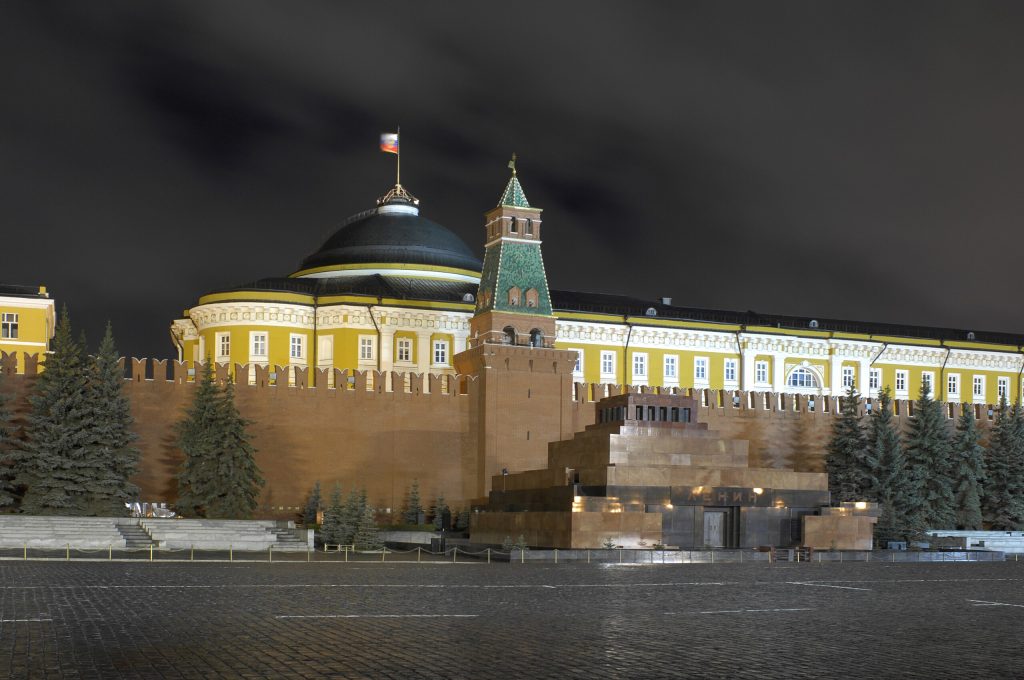
Lenin’s Mausoleum in front of the Kremlin, 2007
(Wiki Image By Andrew Shiva / Wikipedia, CC BY-SA 4.0, https://commons.wikimedia.org/w/index.php?curid=24461849)
Vladimir Lenin’s legacy is profoundly dualistic and controversial: he is revered by some as a revolutionary hero who founded the world’s first socialist state and championed the oppressed, while others condemn him as the architect of a brutal totalitarian system that pioneered the use of mass terror and led to the deaths of millions.
The Revolutionary and Nation-Builder
For his admirers and for much of the 20th century’s global communist movement, Lenin’s legacy is that of a brilliant and successful revolutionary who changed the course of history.
- Founder of the Soviet Union: He was the architect of the October Revolution and the founder of the USSR, which he built from the ashes of the Russian Empire. He transformed Russia into a global superpower that would challenge the United States for dominance for much of the 20th century.
- Master Political Theorist: His adaptation of Marxism, known as Marxism-Leninism, provided a practical blueprint for seizing and holding power. His concept of the “vanguard party” became the model for revolutionary movements worldwide.
- Symbol of Anti-Imperialism: For decades, Lenin and the Soviet Union were seen as a source of inspiration and support for anti-colonial movements across Asia, Africa, and Latin America, offering an alternative to Western capitalism and imperialism.
The Architect of Totalitarianism
For his critics and for the millions who suffered under communist regimes, Lenin’s legacy is one of death, terror, and the destruction of freedom.
- Pioneer of the One-Party State: He deliberately dismantled any semblance of democracy in Russia by dissolving the elected Constituent Assembly. He created the one-party dictatorship, a new form of government where all political power was monopolized by a single entity, a model later copied by other totalitarian regimes.
- Creator of Institutionalized Terror: Lenin did not just use violence; he made it a formal and essential tool of state power. He created the Cheka (the first Soviet secret police) and institutionalized the Red Terror, a system of mass arrests, executions, and concentration camps (the Gulag system began under his rule). This set the precedent for the far greater horrors of Stalin’s rule.
- Economic Devastation: His policy of War Communism led to catastrophic famine and the collapse of the Russian economy, causing the deaths of several million people from starvation and disease.
Ultimately, Lenin’s most enduring legacy was the creation of a powerful state that was fundamentally hostile to individual liberty, democracy, and the rule of law. While Joseph Stalin perfected and amplified the brutality of the Soviet system, it was Lenin who provided the blueprint and laid the foundations.
Similarities and Differences Between Qin Shi Huang (Legalism), Augustus (Roman Empire), Washington (Democracy), and Lenin (Communism)
The core similarity between Qin Shi Huang, Augustus, Washington, and Lenin is that they were all transformative state-builders who rose to power during a period of crisis and founded a new political order. Their fundamental difference lies in their methods and the nature of the states they created: Qin and Lenin used brutal, revolutionary force to build totalitarian systems, while Augustus and Washington created more stable orders, with Augustus preserving the illusion of the old system and Washington uniquely establishing a system based on limited, popular consent.
Key Similarities
Despite their vastly different eras and ideologies, the four leaders share several striking similarities.
- Unifiers of a Fractured State: Each man came to power when his nation was in a state of chaos or collapse. Qin ended the Warring States period, Augustus ended the Roman civil wars, Washington united a weak confederation of states after a revolution, and Lenin seized control of a collapsed Russian Empire.
- Pragmatic and Ruthless Leaders: All four were pragmatists who were willing to use ruthless methods to achieve their political goals. Qin’s brutality was overt, Lenin institutionalized terror, Augustus purged his political rivals, and Washington led a bloody eight-year war for independence.
- Founders of a “New Order”: Each leader established a new and durable political system that replaced a failed one. They were not mere conquerors or temporary rulers but architects of a new form of government that would last for generations.
- Cult of Personality: Each, to varying degrees, became the living symbol of the state they created. Qin was the first Emperor, Augustus the Princeps, Washington the “Father of His Country,” and Lenin the icon of the Soviet Union.
Fundamental Differences
The differences in their philosophies and the governments they built are profound.
- Source of Legitimacy:
- Qin & Lenin: Their legitimacy came from raw power and ideology. They seized control through conquest and revolution and maintained it through force and the imposition of a single, mandatory belief system (Legalism/Communism).
- Augustus & Washington: Their legitimacy was based on existing institutions and popular support. Augustus carefully worked within the shell of the Roman Republic, while Washington derived his authority from the Constitution and the consent of the governed.
- View of the Individual and the State:
- Qin & Lenin: The state is absolute, and the individual exists only to serve it. Individual rights, dissent, and political opposition were seen as threats to be eliminated.
- Augustus: The state provides stability and peace, but the citizen still has traditional rights and a private life, as long as they do not challenge the emperor’s authority.
- Washington: The state exists to protect the inalienable rights of the individual. Power resides with the people, not the government.
- Nature and Legacy of Power:
- Qin & Lenin: They created systems of absolute, centralized, and perpetual power. Their goal was to create a permanent dictatorship, whether by a hereditary emperor or a vanguard party.
- Augustus: He created a system of absolute power disguised as a temporary necessity, which then became a permanent imperial system.
- Washington: He created a system of limited, temporary, and transferable power. His most radical and unique act was to voluntarily give up power, establishing a precedent that was the antithesis of the other three.
| Feature | Qin Shi Huang | Augustus | George Washington | Vladimir Lenin |
| Path to Power | Military Conquest | Victory in the Civil War | Victory in Revolution, then Election | Revolutionary Coup |
| View of the State | The State is Absolute | The State Provides Stability | The State Serves the Individual | The Party is the State |
| Individual Rights | Non-existent | Traditional, but subordinate | Paramount and Inalienable | Subordinate to the Collective |
| Legacy of Power | Absolute Monarchy | Absolute Empire | Limited, Democratic Republic | Absolute Totalitarian State |
Table Comparing Qin Shi Huang (Legalism), Augustus (Roman Empire), Washington (Democracy), and Lenin (Communism)
Here is a table comparing the governmental changes and philosophies of Qin Shi Huang, Augustus, George Washington, and Vladimir Lenin.
| Feature | Qin Shi Huang (Legalism) | Augustus (Roman Empire) | George Washington (Democracy) | Vladimir Lenin (Communism) |
| Primary Goal | Unification & Centralization | Stability & Order | Liberty & Self-Governance | Total revolution & creation of a new society |
| Path to Power | Brutal military conquest of rival states. | Victory in a series of civil wars. | Victory in a revolution, followed by a democratic election. | Violent revolutionary coup against the state. |
| Method of Rule | Absolute autocracy based on strict laws and harsh punishments. | Autocracy disguised by the outward forms of the old Republic. | Constitutional Republic with separation of powers and rule of law. | Totalitarian dictatorship with a single vanguard party controlling all aspects of life. |
| View of the State | The state is supreme; the individual exists only to serve it. | The state provides peace and stability (Pax Romana); the Emperor is the ultimate authority. | The state exists to protect the inalienable rights of the individual. | The Communist Party is the state, acting as the “dictatorship of the proletariat.” |
| Individual Rights | Non-existent. Dissent and intellectual freedom were brutally suppressed. | Traditional rights were preserved, but political opposition to the Emperor was eliminated. | Paramount. The entire system was built to protect individual liberty. | Subordinate to the collective. Individual rights were subordinated to the party’s goals. |
| Legacy of Power | Established the system of absolute, hereditary imperial rule that defined China for 2,000 years. | Established the office of the Roman Emperor, creating a system of absolute, de facto hereditary rule. | Established a system of limited, elected executive power with a precedent for peaceful transfer. | Created the model for the 20th-century totalitarian state, based on absolute, one-party rule. |
Qin Shi Huang (Legalism), Augustus (Roman Empire), George Washington (Democracy), and Vladimir Lenin (Communism) are alive today!
If these four titans of history were suddenly alive today, they would be utterly bewildered by our technology but would instantly recognize the timeless dynamics of power. Each would have a unique and powerful reaction to the modern world, likely finding it both impressive and deeply flawed by their own standards.
Here’s how each might react.
Qin Shi Huang: The Unifier 🐉
Forced conformity and absolute control.
The First Emperor would be horrified by modern individualism, free speech, and the internet’s chaos. However, he would be mesmerized by the state’s technological power—seeing surveillance cameras, facial recognition, and social credit systems as the ultimate tools of his Legalist philosophy.
He would see modern democracy as inefficient and weak, believing society’s problems could only be solved by imposing a single, absolute standard on everyone, enforced with an iron fist. He would likely seek out the most authoritarian state on the planet, offering his services to help them achieve true “harmony” through total control.
His likely thought: “You have the technology to enforce perfect order and unity, yet you allow dissent and debate? A monumental waste of power.”
Augustus: The Stabilizer 🏛️
Pragmatic order and the illusion of tradition.
Augustus would be the most adaptable. He would be deeply impressed by the scale of our globalized system (seeing the Pax Americana as a successor to his Pax Romana). He would immediately grasp the power of modern media, branding, and public relations, seeing it as a more efficient way to build consensus than his own methods.
He would be appalled by the constant, public political bickering and would view 24/7 news cycles as a source of instability. His goal would be to restore order and a sense of dignity. He’d likely become a master political consultant, a media mogul, or the CEO of a “too big to fail” corporation, quietly pulling the strings to ensure stability while projecting an image of calm authority.
His likely advice to modern leaders: “You talk too much and build too little. Project an image of tradition and normalcy while you consolidate real power.”
George Washington: The Reluctant Leader 🇺🇸
Civic virtue and the fear of power.
Washington would be filled with a mixture of awe and profound disappointment. He would marvel at the power and prosperity of the nation he helped create but would be horrified by the intense political polarization and the very “entangling foreign alliances” he warned against.
His republican ideals would be offended by the immense influence of money in politics and the cult of personality surrounding modern leaders. He would be a fierce advocate for civic virtue, compromise, and national unity. He would likely refuse all interviews, detest social media, and reluctantly give speeches calling the nation back to its founding principles before returning to a quiet, private life.
His likely lament: “We built a republic to be governed by citizens of character, not to be torn apart by factious passions amplified for all to see.”
Vladimir Lenin: The Revolutionary
Overthrowing the system, by any means necessary.
Lenin would see the modern world as the ultimate confirmation of his theories. Global capitalism, with its massive corporations, extreme wealth inequality, and gig economy, would be “Imperialism, the Highest Stage of Capitalism” made real.
He would be energized, seeing the internet and social media as the most powerful tools for propaganda and organization ever created. He would dismiss all modern democracies as a sham—a “dictatorship of the bourgeoisie” with a friendly face. He’d argue that the system cannot be reformed and must be overthrown. He would immediately start an online journal, a podcast, or a TikTok channel to build a new global “vanguard party” of digital revolutionaries, seeking to turn every social issue into a catalyst for total system collapse.
His likely call to action: “Workers of the world—your online platforms are the new printing press! Expose the capitalist lies and organize! Seize the means of digital production!”



